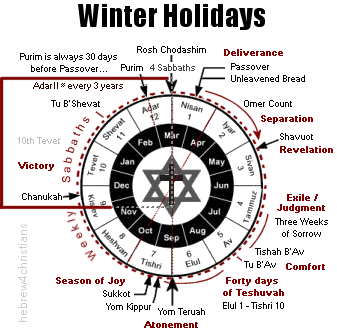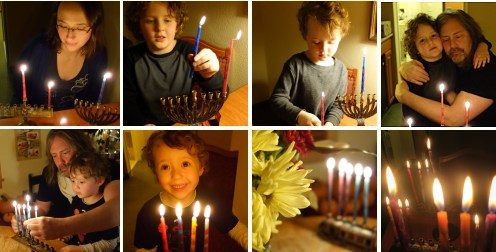|
Jewish Holiday Calendar
Note: For site updates, please scroll past this entry....
The winter holidays (חגי החורף) remember special times when God acted on behalf of His people so that they would triumph over their enemies, and therefore they prophetically picture the final victory in the world to come.
The Winter Holidays:
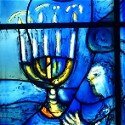
Note that in accordance with tradition, the following holiday dates begin at sundown:
- Month of Kislev (Sat., Nov. 2nd, 2013)
- Four Sabbaths: Vayetzei, Vayishlach, Vayeshev, Miketz
- Dates for Chanukah 2013:
- 1st candle: Wednesday, Nov. 27 [Kislev 25]
- 2nd candle: Thursday, Nov. 28th [Thanksgiving Day - US]
- 3rd candle: Friday, Nov. 29th [Shabbat Miketz]
- 4th candle: Saturday, Nov. 30th
- 5th candle: Sunday, Dec. 1st
- 6th candle: Monday, Dec. 2nd
- 7th candle: Tuesday, Dec. 3rd
- 8th candle: Wednesday, Dec. 4th [Zot Chanukah]
- Month of Tevet (Mon., Dec. 2nd, 2013)
- Month of Shevat (Wed., Jan. 1st, 2014)
- Month of Adar I (Thur., Jan. 30th, 2014)
- Month of Adar II (Sat., March 1st, 2014)
- Four Sabbaths: Vayikra, Tzav (Zachor), Shemini (Parah), Tazria (Ha'chodesh)
- Ta'anit Esther - the fast of Esther (Thur. March 13th)
- Purim - The Festival of Lots (Sat. March 15th) [14th of Adar II]
- Shushan Purim - Purim in Israel (Sun. March 16th) [15th of Adar II]
November 2013 Updates
Happy Chanukah!

11.30.13 (Kislev 27, 5774) We celebrated the first few days of Chanukah away from home this year, since we traveled to see my family for Thanksgiving... Here are a few pictures we took of our first days of Chanukah celebration:
Left-to-right (top): 1. Olga; 2. Josiah; 3. Judah; and 4. John and Josiah
(bottom): 1. John and Judah; 2. Judah shines; 3. Chanukah glow; and 4. array of candles
The Torah records that God's first words were "Let there be light" (i.e., yehi or: יְהִי אוֹר) and then states that "God separated (וַיַּבְדֵּל) this light from the darkness (Gen. 1:3-4). It is this "separation," or distinction, that is foundational to the concept of kedushah (קְדֻשָּׁה), or "holiness," a term that first appears regarding the distinction between ordinary and sacred time: "God blessed the seventh day and made it holy" (יְקַדֵּשׁ) because on it God rested from all his work that he had created to do" (Gen. 2:3). We are called away from the darkness to come into the light. Indeed the very purpose of salvation is "to turn from darkness to light and from the power of Satan to God" (Acts 26:18).
When the darkness seems to enshroud your way, pray for God's light to be rekindled within your soul. Keep faith that your gloom will soon pass, and that darkness and despair will not be your final end. Your mourning will find its comfort, your tears will be wiped away, and your grief will find its solace... Ask God to transform your heartache into the holy resolve to live and die for the truth of His great love.
Personal Update: Please keep me (John) in your prayers. I contend with chronic pain issues and also severe asthma. Thank you so much....
 |
Thanksgiving to God...
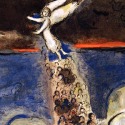
[ This year the holiday of Chanukah and Thanksgiving coincide as "Thanks-nukah"... ]
11.27.13 (Kislev 25, 5774) "We give thanks to You, O God; we give thanks, for Your Name is near. We recount your wondrous deeds" (Psalm 75:1). We give thanks to God because his salvation (יְשׁוּעָה) has come near in the name of Yeshua (Phil. 2:9-11). Note that the adverb "near" (i.e., karov: קָרְבָּן) means "close enough to touch," and indeed the noun form means "a near kinsman" (i.e., kinsman redeemer). Because of Yeshua, God Himself has become our "close relative." Confession (i.e., todah: תּוֹדָה) and trust (i.e., emunah: אֱמוּנָה) are central here. As it is written: "The word is very near you [כִּי־קָרוֹב אֵלֶיךָ הַדָּבָר מְאד] - as close as your mouth and your heart (Deut. 30:14). You must confess with your mouth and believe "in your heart" that God loves you with an "everlasting love." Whoever calls upon the Name of the LORD will not be disappointed (Joel 2:32; Rom. 10:9-13; Psalms 86:5).
הוֹדִינוּ לְּךָ אֱלהִים הוֹדִינוּ וְקָרוֹב שְׁמֶךָ
סִפְּרוּ נִפְלְאוֹתֶיךָ׃
ho·di·nu · le·kha · E·lo·him · ho·di·nu · ve·ka·rov · she·me·kha,
sip·pe·ru · ni·fle·o·te·kha

"We give thanks to You, O God; we give thanks, for Your Name is near.
We recount your wondrous deeds" (Psalm 75:1)

Download Study Card
Note: The American holiday of "Thanksgiving" certainly has its roots in the Jewish tradition of giving thanks to God, and some historians believe that the early pilgrims derived the idea directly from the festival of Sukkot (i.e., "Tabernacles"). For more information, click here.
Believing to See...
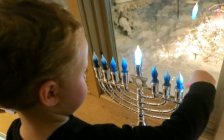
[ The holiday of Chanukah begins tonight at sundown... ]
11.27.13 (Kislev 25, 5774) Do you need to understand before you will believe? The midrash says that God offered the Torah to each of the 70 nations, but each nation first asked to understand what was required of them, and then rejected the offer... Finally God approached Israel and asked: "Will you accept my Torah?" And they replied, kol asher dibber Adonai na'aseh (כּל אֲשֶׁר־דִּבֶּר יְהוָה נַעֲשֶׂה), "all that the LORD has spoken we will do" (Exod. 19:8). In other words, Israel was willing to accept the Torah even before they understood what was required of them. Later they reaffirmed their simplicity of heart by saying na'aseh ve'nishma: "We will do and then we will understand" (Exod. 24:7). Praise the LORD God of Israel: You don't have to work to receive the light - it comes to you as you are, requiring only that you open your eyes to behold it... God is the inner radiance of reality; by his light we are able to see light (1 John 1:5; Psalm 36:9).
 |
Love not the World...

[ The following is related to the holiday of Chanukah, which begins tonight at sundown... ]
11.27.13 (Kislev 25, 5774) Regarding the verse, "And the earth was without form and void (תהוּ וָבהוּ), and darkness was upon the surface of the deep" (Gen. 1:2), the midrash comments: "Darkness – these are the Greeks who darkened the eyes of the Jewish nation with their evil decrees." The utter darkness of Hellenistic thought came disguised as an angel of light, as "enlightened" thinking, but whenever such humanism usurps the authority of divine revelation, the result is exile and darkness. Indeed, the very worst kind of exile is to be unaware that you are in exile, to be so blinded that you do not see that you do not see... As Yeshua said, "If the light in you is darkness, how great is the darkness!" (Matt. 6:23); and "be careful lest the light in you be darkness" (Luke 11:35). In the end, the world and its blind lusts will pass away, for it is "tohu" (תּהוּ) - confusion and unreality - but whoever does the will of God abides forever (1 John 2:15-17).
The realm of this "fallen world" -- understood in terms of the "fellowship" (κοινωνία) of darkness -- is something from which we are delivered and of which we are no longer to be enslaved. As it is written, "God has delivered us from the domain of darkness and transferred us to the kingdom of his beloved Son" (Col. 1:13). Likewise Yeshua said, "If you belonged to the world, the world would love you as its own" (John 15:19). In other words, we are "in" but not "of" this world (John 17:15), and though we physically coexist with others in this time-space, we are no longer citizens of this fallen world and its underlying value system. We are not to love this world, nor the things this world values, since doing so embraces a philosophy of life that is at war with the Father and contrary to the truth of eternity (1 John 2:16; James 4:4). The fallen world values "the flesh" and the "desire of the eyes" that is patterned according to the "arrogance of life." In other words, it is a "beauty pageant" that esteems others based on their accidental qualities instead of their inner and essential qualities. In this connection, let me quote from Henri Nouwen regarding slavery to the world and its perverse value system:
At issue here is the question: "To whom do I belong? God or to the world?"... As long as I keep running about asking: "Do you love me? Do you really love me?" I give all power to the voices of the world and put myself in bondage because the world is filled with "ifs." The world says: "Yes, I love you if you are good-looking, intelligent, and wealthy. I love you if you have a good education, a good job, and good connections. I love you if you produce much, sell much, and buy much." There are endless "ifs" hidden in the world's love. These "ifs" enslave me, since it is impossible to respond adequately to all of them. The world's love is and always will be conditional. As long as I keep looking for my true self in the world of conditional love, I will remain "hooked" to the world - trying, failing, and trying again. It is a world that fosters addictions because what it offers cannot satisfy the deepest craving of my heart." (Nouwen: Return of The Prodigal Son; p42-43)
"Love not the world, neither the things of this world" (1 John 2:15). We see then the connection between worldliness and idolatry, since idolatry essentially involves trying to find your identity, your worth, your satisfaction, and your ultimate fulfillment in the realm of the transitory and the finite rather than in God.... We are (rightly) warned against the vices of "worldliness" and are admonished to abstain from popular culture and its spurious values, but note well that worldliness extends well beyond all this, since it concerns understanding the identity and nature of the person as a whole. The fruit of worldliness is the result of being rooted in this world rather than in God's kingdom. The various desires of the human heart - even the desire for "normal things" like personal happiness in this world - may be regarded as entirely "worldly" if they are devoid of submission to God and His rule....
A principle of spiritual life is that the "inner is not the outer," and vice-versa. People are easily deceived by mere appearances, yet the eye of faith must be trained to look beyond surface phenomena to discern the underlying Reality that upholds the world. This is perhaps most evident in the case of the cross of Yeshua, which the carnal eye regards as a matter of shame and defeat, but the eye of faith regards as the very wisdom, power, and love of Almighty God Himself... Of Yeshua it is said, "he [Messiah] grew up before him like a young plant, and like a root out of dry ground; he had no form or majesty that we should look at him, and no beauty that we should desire him."
Those who rely on mere appearances will invariably find themselves confounded. The LORD therefore commissioned the prophet: "Go, and say to this people: 'Keep on hearing, but do not understand; keep on seeing, but do not perceive'" (Isa. 6:9). Where it is written, "God gave them over to their stubborn hearts, to follow their own devices" (Psalm 81:12; Rom. 1:24); and "they went backward and not forward" (Jer. 7:24), we learn there is no place of "neutrality" or studied indifference toward God... We are either going forward with Him or going backward; we are either drawing near or pulling our hearts away (Rev. 3:16).
 |
The Lights of Chanukah...
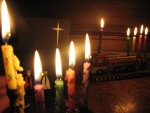
[ Chanukah begins this Wednesday, Nov. 27th at sundown... ]
11.26.13 (Kislev 23, 5774) For each of the days of Chanukah we light candles, kindling one for the first day, two for the second, and so on until we reach the climactic eighth day, when all shine together. Some of the sages say the word "Messiah" (i.e., mashiach: מָשִׁיחַ) may be regarded as an acronym for the phrase "we light throughout the eight days of Chanukah," i.e., מַדְלִיקִין שְׁמוֹנָה יְמֵי חֲנוּכָּה: madlikin (מ) shemonah (שׁ) yemei (י) Chanukah (ח). Indeed, the central lamp of the Chanukah menorah is called the shamash (שַׁמָש), the "Servant" that bears the original flame that kindles all the others. The salvations, wonders, and solace that God performed for us "in those days, at this time" therefore prefigure the greater deliverance we have in Yeshua, the Suffering Servant and Light of the World...
Together with Messiah we shine!
Why Chanukah Matters...
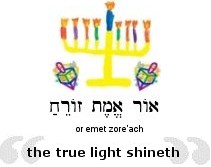
11.26.13 (Kislev 23, 5774) During this time of year -- and especially during this dark hour of history just before the "End of Days" -- it is vital to remember that we are in the midst of the great "war of the ages," where people's souls and destinies are at stake. Yes, this world is likened to the "Valley of Decision," the corridor to the world to come... We cannot afford to be indifferent to the darkness that continues to blind the eyes of so many people. We must take a stand for God's truth and be fully equipped to give an account for the hope we have in Yeshua. Ultimately the "cleansing of the Temple" is a matter of the heart, chaverim.
We are all called to "fight the good fight of faith" and to take hold of the eternal life given to us in Yeshua our LORD (1 Tim. 6:12). Among other things this means refusing to assimilate with the corrupt world system (Κόσμος) and forfeiting our identity in Yeshua (Rom. 12:2; 1 John 2:15; James 4:4). Chanukah is therefore a "fighting holiday" -- a call to resist the oppression of this world and to rededicate our lives entirely to God. Indeed, of all the people in the world, those who love Yeshua should should understand the deep meaning of Chanukah and to rejoice that our Savior has overcome the darkness of this world.
 |
The ultimate message of Chanukah is eschatological and full of hope. This world is passing away and the Kingdom of Heaven will one day be established upon the earth. We live in light of this blessed hope (Titus 2:11-13). The world's rulers are "on notice" from God Almighty: their days are numbered and they will surely face the judgment of the LORD God of Israel (Psalm 2). We must stand against evil by refusing to conform to the world around us (Eph. 6:11-18). Now is the time. "Let your light so shine before others that they may see your good works and give glory to your Father who is in heaven" (Matt. 5:16). Followers of Yeshua are part of His Temple - members of His Body - and during this season we should heed the call to rededicate our lives to Him.
כָּךְ יָאֵר נָא אוֹרְכֶם לִפְנֵי בְּנֵי אָדָם
לְמַעַן יִרְאוּ אֶת מַעֲשֵׂיכֶם הַטּוֹבִים
וִיכַבְּדוּ אֶת־אֲבִיכֶם שֶׁבַּשָׁמָיִם
kakh · ya·er · na · o·re·khem · lif·nei · be·nei · a·dam
le·ma·an · yir·u · et · ma·a·se·khem · hat·to·vim
vi·kha·be·du · et · a·vi·khem · she·ba·sha·ma·yim

"Let your light so shine before men,
that they may see your good works,
and glorify your Father in heaven."
Οὕτως λαμψάτω τὸ φῶς ὑμῶν ἔμπροσθεν τῶν ἀνθρώπων,
ὅπως ἴδωσιν ὑμῶν τὰ καλὰ ἔργα,
καὶ δοξάσωσιν τὸν πατέρα ὑμῶν τὸν ἐν τοῖς οὐρανοῖς

"May the God of hope (אלהֵי הַתִּקְוָה) fill you with all joy and peace in believing, so that by the power of the Holy Spirit you may abound in hope" (Rom. 15:13). Yes - may you be filled with the light of true hope, and may you always wear the "armor of light" (Rom. 13:12). Chag Urim Same'ach - "Happy Festival of Lights!"
Note: For those who want additional information about why Chanukah is genuinely significant for a follower of Jesus, please see the article, "Let your light shine - Why Christians should celebrate Chanukah." I hope you will find it encouraging, chaverim.
The Chanukah Prophecies...

11.25.13 (Kislev 22, 5774) Many Bible scholars say that the prophet Daniel (6th Century BC) foresaw the rise of Alexander the Great centuries beforehand in the vision of a "male goat running from the west" that had a conspicuous horn between its eyes (see Dan. 8:1-12; 21-22). This goat destroyed the power of the kings of Media and Persia (symbolized by two horns on a ram, Dan. 8:20). Though the "goat" (Alexander) became exceedingly great, eventually its horn was "broken into four [kingdoms]," and out of these four horns arose a "little horn" (i.e., the Seleucid king Antiochus "Epiphanes," c. 175-163 BC) who had authority over "the glorious land" (i.e., Israel). This "little horn" (קֶרֶן מִצְּעִירָה) greatly magnified itself, cast down some of the stars (i.e., righteous souls), took away the sacrifices, and defiled the very Sanctuary in Jerusalem.
Antiochus is perhaps most notorious for setting up an altar to Zeus over the altar of burnt offering in Temple compound and sacrificing a pig within the Sanctuary of the Temple itself. This sacrilege is otherwise known as the "abomination of desolation" (שִׁקּוּץ מְשׁמֵם) that was decreed to occur 2,300 days into Antiochus' reign (Dan. 8:13-14). Notice, however, that Daniel's prophecy has a "dual aspect" to it, and the description of the rise of the "little horn" (in Dan. 8:9-10) suggested something far more portentous than the reign of a local tyrant. This horn "grew exceedingly great toward the south, toward the east, and toward the glorious land. It grew great, even to the host of heaven. And some of the host and some of the stars it threw down to the ground and trampled on them."
In light of other New Testament scriptures, it is clear that this "exceedingly great horn" refers to future world leader (sometimes called the "Antichrist" or "Messiah of evil" ) who would one day "assimilate" all of humanity into a "New World Order" (Dan. 9:26-27, 2 Thess. 2:3; Rev. 13:7-9, etc.). It is likely that it was this sense of the "abomination that makes desolation" that Yeshua referred to in Matt. 24:15 and Mark 13:14, and it is this "abomination that makes desolation" that will be overthrown by Yeshua at the end of the Great Tribulation period (Dan. 8:23-25; Matt. 24:30; Rev. 19:11-16; 20:2, etc.).
 |
The intertestamental Book of Maccabees (c. 2nd Century BC) tell us more about this "little horn" and his vicious oppression of the Jewish people. Antiochus installed Hellenistic Jews to the priesthood and demanded the adherence to Hellenistic cultural ideals. He established edicts that prohibited observing the weekly Sabbath and the other biblical festivals. The reading of the Torah was outlawed and all copies of it were ordered to be burned. Temple sacrifices were forbidden; circumcision was outlawed and the penalty for disobedience was death. Women who disobeyed the edict by circumcising their sons were paraded about the city with their babies hanging at their breasts and then thrown down from the top of the city wall (2 Macc. 6:1-11). Many Jews fled and hid in the wilderness and caves and many died kiddush HaShem - as martyrs (see Heb. 11:36-39). Eventually Jewish resistance to this imposed Hellenization meant war. In 164 BC, in Modin, a small town about 17 miles from Jerusalem, Mattityahu (Matthias), a Hasmonean priest, and his five sons took refuge. When Antiochus' soldiers arrived at Modim to erect an altar to Zeus and force the sacrifice of a pig, Mattityahu and his sons rose up and killed the Syrians. They then fled to the Judean wilderness and were joined by other freedom fighters. After some organizing, they soon engaged in successful guerrilla warfare against their Syrian/Greek oppressors. The three-year campaign culminated in the cleansing and rededication of the Temple (for more on this subject, see Chanukah and Spiritual Warfare).
Note: For more on this subject, see "Why Christians should celebate Chanukah."
 |
The Miketz Prophecies...
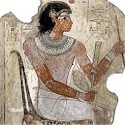
[ Our Torah reading for the Shabbat of Chanukah is parashat Miketz, i.e., Gen. 41:1-44:17. ]
11.25.13 (Kislev 22, 5774) Our Torah portion this week is miketz (מקץ), a word that means "at the end," and therefore it points to the prophetic future (i.e., the "end of days" or acharit ha-yamim). Just as Joseph was a "dreamer" who was betrayed by his brothers but was promoted to a place of glory by the hidden hand of God, so Yeshua was betrayed by his people yet was exalted over all the nations (מֶלֶךְ הַגּוֹיִם). And just as Joseph later disguised himself as a "stranger" and an "Egyptian" to his brothers but was finally revealed to be their savior, so will the Jewish people eventually come to see that Yeshua is the true Savior of Israel. Then will come true the hope of Rav Sha'ul (the Apostle Paul) who wrote, "And so all Israel shall be saved: as it is written, 'There shall come out of Zion the Redeemer (גּוֹאֵל) who shall turn away ungodliness from Jacob'" (Rom. 11:26).
Note: For more on this topic, see "Joseph and his brothers."
 |
Chanukah Blessing Cards...

11.24.13 (Kislev 21, 5774) The Chanukah Blessings page includes some free "Hebrew Study Cards" you can use for your Chanukah celebrations. Each card includes the Hebrew text, phonetic transliteration, and English translation for the blessing. In addition I have recorded Hebrew audio clips for the Chanukah blessings as well, so you can listen to the Hebrew as your learn to recite the blessings...
To make it a bit easier during the candle lighting celebration, I have created a handy one page summary of the blessings you can download here. I hope you find this material helpful, chaverim! Chag Chanukah Sameach (חַג חֲנֻכָּה שָׂמֵחַ)!
הָאוֹר מֵאִיר בַּחשֶׁךְ וְהַחשֶׁךְ לא הִשִּׂיגוֹ
ha-ohr · me·ir · ba·cho·shekh, · ve·ha·cho·shekh · lo · his·si·go

"The light shines in the darkness, and the darkness
will never overcome it" (John 1:5)

Parashat Miketz - מקץ
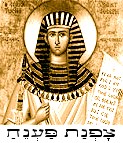
[ Note: Chanukah runs from Wed. Nov. 27th (i.e., Kislev 25) to Thurs., Dec. 5th this year. The weekly Torah reading is not suspended for Chanukah (as it is for Passover and Sukkot), though additional Torah readings are read for each of the eight days of the holiday. ]
11.24.13 (Kislev 21, 5774) In our Torah portion for Chanukah week, we read how Joseph successfully interpreted Pharaoh's dreams and quickly rose to power in Egypt. Because of a famine in the land of Canaan, however, his brothers came to Egypt in search of food. A disguised Joseph then tested his brothers to see whether they were the same people who had callously sold him into slavery, or whether they had undergone teshuvah (repentance).
The eventual revelation of Joseph and his reconciliation with his brothers is a prophetic picture of acharit ha-yamim (the "End of Days") when Israel, in Great Tribulation, will come to accept Yeshua as Israel's true deliverer. Presently, the veil is still over the eyes of the Jewish people and they collectively regard Yeshua as an "Egyptian" of sorts. In this connection, I list some of the ways that Joseph is a "type" or foreshadowing of the coming Yeshua as the Suffering Servant (see "Mashiach ben Yosef").
Note: For more information, please read the Torah summary page for Miketz and its related articles. You can also download the Shabbat "Table Talk" for the portion here:
The Light of Chanukah...

[ Chanukah begins in just five days, on Wednesday, Nov. 27th at sundown... ]
11.22.13 (Kislev 19, 5774) The Hebrew word Chanukah (חֲנֻכָּה) means "dedication" and marks an eight day winter celebration that commemorates the victory of faith over the ways of speculative reason, and demonstrates the power of miracle in the face of mere humanism. Although it is customarily observed as a "Festival of Lights," Chanukah is better understood as a "fighting holiday," since its central message is to resist assimilation to this world and to exercise faith in the LORD (1 John 2:15; Rom. 12:2). For us, Chanukah further remembers the light of Yeshua, the One who overcame the world for us (John 16:33).
Notice that the word chinukh (חִנּוּךְ), "education," shares the same root as the word chanukah (i.e., chanakh: חָנַךְ). Unlike the Greek view that regards education as a pragmatic process of improving one's personal power or happiness, the Jewish idea implies dedication/direction to God and His concrete purposes on the earth: "Train (חֲנךְ) a child in the way he should go..." (Prov. 22:6). Disciples of Yeshua are likewise called talmidim (תַּלְמִידִים) -- a word that comes from lamad (לָמַד) meaning "to learn" (the Hebrew word for teacher is melamad (מְלַמֵּד) from the same root). In the Greek New Testament, the word "disciple" is μαθητής, a learner or a pupil of a διδάσκαλος, or a teacher. True education is therefore foundational to being a disciple of the Messiah.
An essential part of our education in the Holy Spirit is to learn our identity as God's beloved children (1 John 3:1; James 4:4). We are to know ourselves in terms of what God has done for us, and not as the world defines us (2 Cor. 5:16). "If then you have been raised with Messiah, seek the things that are above (τὰ ἄνω ζητεῖτε), where the Messiah is seated at the right hand of God; focus your thoughts on the things above - not on things here on earth - for you have died, and your life has been hidden with Messiah in God" (Col. 3:1-4).
If we are spiritually identified with Yeshua, we are "dead" to this age (olam hazeh) and awakened to a realm that transcends the appeals of the flesh (olam habah). We no longer live chayei sha'ah (חַיֵּי שָׁעָה, "fleeting life") but chayei olam (חַיֵּי עוֹלָם, "eternal life"). The aorist verb "you have died" indicates "you have died once for all," that is, that this is a condition granted by the power and agency of God on your behalf. You don't "try to die" to the flesh; you accept what God has done by killing its power over you through Yeshua...
You are dead to this world; you are dead to sin's power; you are set free and no longer enslaved to the deception of the worldly matrix, etc. Now you are made alive to an entirely greater and more powerful order and dimension of reality, namely, the spiritual reality that is not disclosed to the vanity of this age. Therefore we are to consciously focus our thoughts (φρονέω) on the hidden reality of God rather than on the temporal world that is passing away: "For we are looking not to the things that are seen but to the things that are unseen. For the things that are seen are transient (i.e., "just for a season," καιρός), but the things that are unseen are eternal" (2 Cor. 4:18).
Shabbat Shalom, dear friends. And please remember us in your prayers... Thank you!
 |
What are you seeking?

[ The following is related to this week's Torah reading, Parashat Vayeshev... ]
11.22.13 (Kislev 19, 5774) From our Torah this week we read: "And a man found him [Joseph] wandering in the fields. And the man asked him, "What are you seeking?" (Gen. 37:15). The sages say this was not an ordinary man but rather an angel sent to encourage Joseph to keep focused despite his forthcoming trials. Note that the Hebrew text literally says the man asked Joseph "to say (i.e., lemor: לֵאמר), 'What will you seek?'" (i.e., mah-tevakesh: מַה־תְּבַקֵּשׁ). In other words, the man asked Joseph to discover what motivated him by asking himself, "What do I seek? What am I looking for?" Indeed, we are often unconscious of what really matters to us. What does your heart seek first of all? Yeshua said, "Seek first the kingdom of God and his righteousness, and all these things will be added to you" (Matt. 6:33). Because Joseph never lost sight of what mattered, he was able to withstand temptation and tribulation for the sake of God's greater blessing.
So what are you seeking today? (John 1:38) The Spirit of the Living God calls out, "Seek Me and live" (Amos 5:4). If you are feeling empty today, ask God to feed you with His life-giving food. Ask Him for energy, power, and strength... Seek the LORD and His goodness. He is faithful and true and will surely answer the sincere cry of the heart: "You will seek me and find me, when you seek me with all your heart."
וּבִקַּשְׁתֶּם אתִי וּמְצָאתֶם
כִּי תִדְרְשֻׁנִי בְּכָל־לְבַבְכֶם
u'vik·kash·tem · o·ti · u·metz·a·tem
ki · tid·re·shu·ni · be·khol · le·vav·khem

"You will seek me and find me
if you search for me with all your heart"
(Jer. 29:13)

Hebrew Study Card
Note that this verse includes the implication that we will discover that the LORD is the answer to our heart's cry for love, significance, purpose, etc., when we search for Him bekhol levavkhem - with all our hearts (but not the other way around). In other words, if we do not search for God authentically - with the full passion of our hearts - then we will not find Him, since God only reveals Himself in the truth of reality. Some things in life are only known in the passion of faith... things like love, beauty, honor, and so on. As Pascal once said, "The heart has its reasons that reason knows not of..."
The problem with many of us is not that we are so hungry, but rather that we are not hungry enough... We settle for junk food when God spreads out his banqueting table before us; we hanker after cheap thrills instead of experiencing the very love of God... There is a "deeper hunger" for life, a more urgent desire, and I pray we are all touched by such yearning; there is a "blessed need" that expresses our soul's cry for God - a "divine discontent" that leads us to a deeper sense of contentment for the heart (Matt. 5:6).
"Seek first the kingdom of God and his righteousness (בַּקְּשׁוּ רִאשֹׁנָה מַלְכוּת אֱלהִים), and all these things will be added to you" (Matt. 6:33). In the end, if we cannot say we have lived well, then nothing else matters... Seeking God is an ongoing journey, a "how" of life, not a recipe or formula, no matter how venerated. Seeking God is the very aim of life, and in the world to come, I am afraid that most of us will regret that we did not pursue the Lord with all our hearts while we had the opportunity to do so.
 |
Enduring the End of Days...
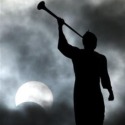
11.21.13 (Kislev 18, 5774) The end of this age draws near, friends; the devil's time is short and therefore we must be all the more vigilant. The Apostle Paul wrote that the time before the "End of Days" would be "perilous" (χαλεπός) and full of human depravity (2 Tim. 3:1-5). In light of the raging spiritual war going on all around us, the following needs to be restated: "The important thing is to not lose your mind..." Yes, it is essential to guard your thinking by immersing yourself in the truth of Scripture... Fear is often the result of believing the lie that God is not in control or is unable/unwilling to help you... "Not losing your mind" therefore means being solidly grounded in what is real, and that means understanding your identity and provision as a child of God. "God has not given us the spirit of fear, but of power, and of love, and of a "sound mind" (σωφρονισμός), lit. a "delivered" mind, "healed" from fragmentation (2 Tim. 1:7). The Greek word "sound mind" (σωφρονισμός) comes from the verb sodzo (σῴζω), meaning "to save," from saos (σάος) "safe," in the sense of being under restraining influence of the Spirit of God...
 |
As I mentioned the other day, there are two basic approaches to "spiritual warfare." The first is to discern the presence of evil and then pray for God's intervention, deliverance, protection, and so on. The second is to use ayin tovah and focus on God instead - to "set your thoughts on things above" (Phil. 4:8). Whereas the former approach may at times seem necessary to dissipate encroaching darkness to find inner peace, the latter approach has the decided advantage of trusting in the Divine Presence that pervades and overrules all things (Psalm 16:8). When David was surrounded by the enemy, he kept focused on the glory of the LORD. David knew that God would shelter him and elevate him above the powers of darkness (Psalm 27:1-6). The highest form of spiritual warfare, then, is to consciously turn away from fear by choosing to praise the LORD God, magnifying His Name, and walking before Him in awe...
One day all that is hidden will become manifest, all secrets will be fully disclosed, and all will finally be healed (Matt. 12:36-37, Isa. 25:8; Rev. 21:4). "As I looked, thrones were placed, and the Ancient of Days took his seat; his clothing was white as snow, and the hair of his head like pure wool; His throne was ablaze with fire and its wheels were all aflame. A river of fire was streaming forth and proceeding from his presence; a thousand thousands served him, and ten thousand times ten thousand stood before him; the court sat in judgment, and the books were opened...." (Dan. 7:9-10).
 |
Presence in Prayer...
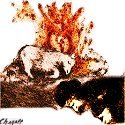
11.21.13 (Kislev 18, 5774) We often need to pray before we can pray... "Lord, teach us to pray" (Luke 11:1). The sages say that when you so pray, your focus should be so concentrated that you are ready to die during the prayer. Regard yourself as a living sacrifice (korban chai) and offer your blood, your body, your soul, your will upon the altar before God (Rom. 12:1). Say, "Lord, I offer myself to Thee, to do with me as Thou will. Relieve me of the bondage of myself, that I might do Thy will..." Ask for the Holy Spirit to breath out the words of God's heart; cleave to God as if you had ascended before the Throne of Grace. "O LORD, open Thou my lips and my mouth shall show forth Thy praise."
אֲדנָי שְׂפָתַי תִּפְתָּח וּפִי יַגִּיד תְּהִלָּתֶךָ
Adonai · se·fa·tai · tif·tach · u·fi · yag·gid · te·hil·la·te·kha

"O Lord, open my lips, and my mouth will declare your praise"
(Psalm 51:15)

Yeshua taught us to abstain from using "vain repetitions" in our prayers, since our Heavenly Father knows what we need before we ask Him (Matt. 6:7-8). Don't worry about the verbiage of your prayers, then, since the Holy Spirit will groan on your behalf (Rom. 8:26). Ultimately prayer is a kind of teshuvah (תְּשׁוּבָה), a word often translated as "repentance," though it's more accurately understood as turning (shuv) to God in response to His call. "When you pray, rather let thy heart be without words than thy words be without heart" (John Bunyan). The point, of course, is that we come to the Lord to do real business with Him, not to play games or to offer "lip service." Are we really "showing up" when we pray?
Joseph and Messiah...
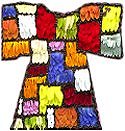
[ The following is related to this week's Torah reading, Parashat Vayeshev... ]
11.20.13 (Kislev 17, 5774) More chapters of the Torah are devoted to the life of Joseph than to the account of creation, the story of Adam and Eve, the flood of Noah, the call of Abram to the promised land, the miraculous birth and (near) sacrifice of Isaac, the transformation of Jacob into Israel, and so on. Joseph is given such prominence in Scripture because his life depicted both the Suffering Servant (Yeshua's first advent) and the One who reigns at the right hand of the power on high and delivers Israel (Yeshua's second advent). The life of Joseph provides a "prophetic outline" of Yeshua the Lord, the One who is both Mashiach ben Yosef (מָשִׁיחַ בֶּן־יוֹסֵף), "the Messiah son of Joseph," as well as Mashiach ben David (מָשִׁיחַ בֶּן־דָוִד), "the Messiah the Son of David."
For more on this subject, including 60 ways in which Joseph prefigured the advent of Yeshua the Messiah, see "Mashiach ben Yosef."
 |
Through the Wound...
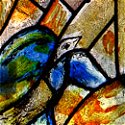
11.20.13 (Kislev 17, 5774) "Find God or die" is a slogan for those who are desperate for deliverance. Many of us have felt abandoned at some time, perhaps because of a tragic event that happened when we were vulnerable or unable to defend ourselves. The painful message implied in any kind of abandonment is, "You are not important; you are not of value." Because of this, we may endlessly search for approval from others, even supposing that God's very love is conditional... We may be tempted to engage in "magical thinking" that God can be bribed with ritual acts or flattery. Part of the healing process is to discover that God comes "through the wound." Despite the pain of our past, we come to trust that all of our life is redeemed, not only that which we can accept, but also that which we can do nothing but agonize and protest. God's grace goes there, too. "You shall not die, but live, and declare the works of the Lord" (Psalm 118:17). God will wipe away your tears, friend...
Where it is written, "How long shall I take counsel in my soul, having sorrow in my heart daily" (Psalm 13:2), the sages remark that just as long as we take counsel in our own soul there will be such sorrow, since only after we realize that no further counsel can help us do we give up and confess our need for God's salvation. Therefore בְּטַח אֶל־יְהוָה בְּכָל־לִבֶּךָ, "trust in the LORD with all your heart, and do not lean on your own understanding" (Prov. 3:5). Mammash - trust in the LORD!
 |
The Danger of Envy...

[ The following is related to this week's Torah reading, Parashat Vayeshev... ]
11.20.13 (Kislev 17, 5774) From our Torah portion this week (Vayeshev) we read: "The brothers saw that their father loved him (אתוֹ) more than all his brothers, and they hated him.." (Gen. 37:4). Envy begrudged the father's love and rationalized rejecting the prophetic significance of Joseph... The brothers were blinded by their own inflated sense of self-importance and their own emotional dishonesty. Instead of saying, "I hate Joseph because my father loves him more than me," the brothers assumed a false motive, and said, "I hate Joseph because my father loves him more than my other brothers..." In this way each brother could take on the offense of the others while minimizing his own. Each brother felt hurt, but none had the courage to admit it, and the sense of personal offense was then transformed into being a matter of seeking "justice" for the group...
Spiritual envy is self-defeating and destructive. Joseph was chosen as the special child of his father because prophetically he saw Yeshua in him. The brothers saw their father loved "him," i.e., אתוֹ, the Aleph-Tav man... If Joseph's brothers had truly loved their father, they would have been happy that he found special consolation in their younger sibling. The Talmud says "one criticizes others for the defects of his own personality," and therefore the brother's accusation that Joseph was arrogant revealed their own inner heart attitude.
It's a matter of maturity to let go of the proverbial need to be seated at the front of the table, to humbly rejoice in the good God gives to others, and so on. Many Christian "anti-Semites" are victims of their own self-destructive envy. Everyone wants to feel special, chosen, and set apart, but how many want to rejoice over the heart of the Father?
 |
The Spices of Mercy...
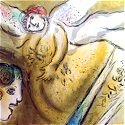
[ The following is related to this week's Torah reading, Parashat Vayeshev... ]
11.20.13 (Kislev 17, 5774) From our Torah portion this week we read: "And they looked up and saw a caravan of Ishmaelites coming from Gilead, with their camels bearing spices, balm, and myrrh, to be taken down to Egypt" (Gen. 37:25). Regarding this verse the sages ask why the Torah includes details about the merchandise of the caravan, and they infer that while God, in his inscrutable plan, decreed that Joseph would indeed be sold into slavery, he nevertheless provided him a measure of comfort during his journey down into Egypt. Therefore we likewise trust that God will season our suffering according to his will with the "spice of his mercies," and with the healing balm of Gilead (1 Cor. 10:13).
The Shema Prophecies...

11.19.13 (Kislev 16, 5774) "Listen, O Israel, the LORD is our God; the LORD is one." Instead of thinking of the Shema (שְׁמַע) as a commandment to be externally obeyed, you can regard it as a prophecy about your inner life: "You shall love (וְאָהַבְתָּ) the LORD your God with all your heart, and with all your soul, and with all your might" (Deut. 6:5). Only God can quicken a dead heart, after all, and fill the soul with holy affections. Only the LORD can impart to us strength needed to take hold of promises as He writes His Torah upon our heart. As it is written, "For from him and through him and to him are all things. To him be glory forever" (Rom. 11:36).
וְאָהַבְתָּ אֵת יְהוָה אֱלהֶיךָ בְּכָל־לְבָבְךָ
וּבְכָל־נַפְשְׁךָ וּבְכָל־מְאדֶךָ
ve·a·hav·ta · et · Adonai · E·lo·he·kha · be·khol · le·vav·kha
u·ve·khol · naf·she·kha · u·ve·khol · me·o·de·kha

"You shall love the LORD your God with all your heart
and with all your soul and with all your might"
(Deut. 6:5)
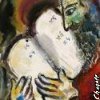
Hebrew Study Card
God will take away your stony heart and give you a new heart, along with a new spirit to be willing to know His love, as it is written, "I will give you a new heart, and a new spirit I will put within you. And I will remove the heart of stone from your flesh and give you a heart of flesh" (Ezek. 36:26). Your new heart will be like Yeshua's own: open, accessible, flexible, trusting, sharing, emotionally alive, able to feel, pulsating with God's energy and power...
The promise is this: "you shall love," since love is what is most true about who you are... You shall love the LORD, since He is the Source and End of all real love. You will love the LORD more and more, as you grow ever closer to Him and one day will behold Him panim-el-panim, "face to face." You shall love the LORD with all your heart, which implies God has indeed given you a new heart to love Him with; and with all your soul, which implies that you are enabled to truly feel, and that your heart is made tender and sensitized; and with all your might - that is, with all your "muchness," your "substance," or that reality that makes you who you really are in the LORD... May the LORD fulfill this prophecy in you, friend.
 |
The Depths of Hebron...

[ The following is related to this week's Torah reading, Parashat Vayeshev... ]
11.19.13 (Kislev 16, 5774) As a child, Joseph was adorned with a "coat of many colors" (כְּתנֶת פַּסִּים) and lived in the glory of his father's house as the favored son. He was an innocent dreamer who was given visions of greatness by God Himself. Despite being despised and rejected by his brothers, however, his father commissioned him "from the depth of Hebron" (מֵעֵמֶק חֶבְרוֹן) to look into their welfare (Gen. 37:14). Notice that the word Hebron (חֶבְרוֹן) comes from a root that means "union" or "fellowship," suggesting that Jacob sent out his beloved son "from the depth their fellowship" to search for his missing children.... Similarly, Yeshua existed in glory with His Father yet chose to divest himself of his splendor to reach out to his brothers. His incarnation was an infinite descent from the "depth of Hebron" (i.e., communion with the Father) into the realm of "no reputation" (i.e., kenosis, "emptying") in search of his brothers' love (Phil. 2:6-7; Luke 19:10).
 |
The Power to Change...
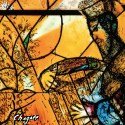
11.18.13 (Kislev 15, 5774) When King David cried out, lev tahor bera-li, Elohim: "Create in me a clean heart, O God" (Psalm 51:10), he did not use the Hebrew word yatzar (יָצַר), which means to "fashion" or "form" something from preexisting material, but he instead used the word bara (בָּרָא), a verb exclusively used to refer to God's creation of the cosmos (Gen. 1:1). David understood that no amount of reformation of his character would be enough, and instead appealed to that very power of God that created the worlds yesh me'ayin (יֵשׁ מֵאַיִן), "out of nothing." Such was the nature of the remedy required...
לֵב טָהוֹר בְּרָא־לִי אֱלהִים
וְרוּחַ נָכוֹן חַדֵּשׁ בְּקִרְבִּי
lev · ta·hor · be·ra·li · E·lo·him,
ve·ru·ach · na·khon · cha·desh · be·kir·bi

"Create for me a pure heart, O God,
and renew a right spirit within me"
(Psalm 51:10)

Hebrew Study Card
Yeshua taught, "Blessed are the pure in heart, for they shall see God" (Matt. 5:8). The Greek word translated "pure" is katharos (καθαρός), sometimes used describe the cleansing of a wound (catharsis), or to describe the unalloyed quality of a substance revealed through refining fire. Metaphorically, then, purity of heart refers to separation from the profane - singleness of vision, wholeheartedness, passion, and focused desire for the sacred. As we center our affections on Yeshua, we become pure in heart -- i.e., unified, made whole, and healed of our inner fragmentation. We see the Lord both in this world, through his effects, and then panim el panim (פָּנִים אֶל־פָּנִים), "face to face," in the world to come. Our hope purifies us for that coming great day of full disclosure (1 John 3:2-3; Heb. 12:14).
If we are impure of heart, we will be inwardly divided, unfocused, fragmented, filled with destabilizing anxiety, envy, anger, and so on. More tragically, because we seek to escape ourselves, we will be devoid of a true center, without a focal point or abiding purpose, and therefore we will be lost to ourselves, wandering and without rest...
May God help each of us keep our focus on what is real! Shalom.
 |
Israel's Rejected Prince...

[ The following is related to this week's Torah reading, Parashat Vayeshev. Please read the Torah portion to "find your place" here. ]
11.18.13 (Kislev 15, 5774) From the beginning of this week's Torah portion (Vayeshev) until the end of Sefer Bereshit (the Book of Genesis), the focus shifts from the patriarch Jacob to his twelve sons, and particularly to his beloved son Joseph (יוֹסֵף). Recall that Joseph's jealous brothers had stripped him of his "coat of many colors" and then mercilessly threw him into a pit -- a providential event that eventually led to the deliverance of the Jewish people by the hand of a "disguised savior." Indeed, story of Joseph's ordeal is a story of divine hashgachah (providential supervision) that foretells the glory of Yeshua our Messiah, both as the Suffering Servant and as a national deliverer of Israel.
The Torah reading begins, "Jacob settled (vayeshev Ya'akov) in the land of his father's sojourning, in the land of Canaan" (Gen. 37:1), but then immediately turns to the story of Joseph, who was seventeen years old at the time: "And these were the generations of Jacob: Joseph being seventeen years old..." (Gen. 37:2). Why does the toldot (genealogy) of Jacob begin with Joseph rather than Reuben (the firstborn son of Leah) here? Was the Torah suggesting that Joseph was regarded by Jacob as his (chosen) "firstborn" son?

Jacob and Joseph undoubtedly shared a lot in common, and this surely caused Jacob to prefer his firstborn son (of Rachel) over his other sons. For instance, both men had infertile mothers who had difficulty in childbirth; both mothers bore two sons; and both were hated by their brothers. In addition, the Torah states that Jacob loved Joseph more than all his other sons since he was the son of his old age, and was the firstborn son (bechor) of his beloved wife Rachel. Indeed, Jacob made him an ornamented tunic (ketonet passim) to indicate his special status in the family.
At any rate, the Talmud (Sanhedrin 106a) notes that whenever the word vayeshev (וַיֵּשֶׁב) is mentioned in Torah, it introduces a painful episode. Immediately following the statement that "Jacob settled (vayeshev Ya'akov) in the land of his father's sojourning," the Torah states that Joseph brought an "evil report" about his brothers to his father. This act ultimately led to the selling of Joseph into slavery and to further heartache for Israel. The Jewish sage Rashi notes that whenever someone called by God wants to "settle down" and live at ease, God orchestrates events to keep him free from complacency. This certainly happened in the case of Jacob, where sibling rivalry and baseless hatred (called sinat chinam: שִׂנְאַת חִנָּם) so disrupted the peace of the family that his children were eventually led into exile and slavery.
But there is redemption and healing, even in the midst of betray and loss... We note that Joseph was sent by his father from the "depth of Hebron" (מֵעֵמֶק חֶבְרוֹן) to seek the welfare of his brothers (Gen. 37:14). Hebron (חֶבְרוֹן) is one of the very first places Abraham lived after he entered the Promised Land (Gen. 13:18). The word itself comes from a root (ח.ב.ר) that means "union," or "friendship," suggesting that from the depth of family union would come struggle but eventual deliverance. The "depths of Hebron" therefore suggests that Joseph's assignment was ultimately redemptive in nature - to restore love to the family by means of God's providential salvation...
Note: This year the eight-day Festival of Chanukah begins Wednesday, November 27th at sundown (1st candle) and runs through Thursday, December 5th.
 |
Parashat Vayeshev - וישב

[ The following is related to this week's Torah reading, Parashat Vayeshev. Please read the Torah portion to "find your place" here. ]
11.17.13 (Kislev 14, 5774) In our Torah portion for this week (Vayeshev), we read how Joseph's jealous brothers stripped him of his "coat of many colors" and threw him into a pit -- a providential event that eventually led to the deliverance of the Jewish people by the hand of a "disguised savior." Indeed, the life of Israel's chosen son Joseph foreshadowed the two advents of Yeshua our Messiah: first as Israel's Suffering Servant, and second as the national deliverer of the Jewish people during tribulation...
Note: For more information, please read the Torah summary page for Vayeshev and its related articles. You can also download the Shabbat "Table Talk" for the portion here:
The Torah within you...

11.15.13 (Kislev 12, 5774) It is always good to review the message of the gospel.... Man's way is to attempt to reform his nature, to strive to follow the law, to resist the impulse to lust and sin, to create "good karma," and so on, whereas God's way is not to make us stronger and stronger, but rather to make us weaker and weaker - by crucifying the old nature... Messiah "in me" abolishes the law (understood as the principle of self-justification), condemns sin in the flesh (by dying on the cross), and kills the power of death itself (by means of his resurrection)... Like all sacrifices brought to the altar, we must pass through death to life by means of our union with the Messiah at the cross... It is only after the cross that it may be said, "It is no longer 'I' who lives; now it is Messiah who lives in me" (Gal. 2:20). But note that the imperatives of the New Testament are directed to the new nature given to us by God, and not to the old nature that's been crucified and done away. We are admonished to live in accordance with the truth of what God has done for us in our Savior. You are a new creation, therefore be who you are in the Messiah!
The Torah says: "Look, I am setting before you today a blessing and a curse" (Deut. 11:26). The Hebrew grammar of this verse begins with the imperative singular "you look!" (רְאֵה) but shifts to the plural, "before you" (לִפְנֵיכֶם), which suggests that though the Word is freely given to everyone "who has ears to hear," it's our personal responsibility to "choose life" and wrestle its message out in our lives... In other words, God offers his blessing to all, but it must be personally received to be your own. "According to your faith, let it be for you" (Matt. 9:29). Yeshua died for your sins so that you can receive everlasting spiritual life, but that blessing has no effect unless and until you open your heart. What does it mean to say that Yeshua is "in you" except to say he lives within the heart of faith? "As long as Christ remains outside of us we are separated from him."
Remember that one of the main goals of the devil is to induce a sense of forgetfulness and apathy... The devil wants you to forget who you really are - a beloved child of the King. The entire venture of teshuvah (repentance) presupposes that you are created "in the image of God," that you are related to him, and therefore you have infinite value and dignity. This is all the more evident in light of the awesome ransom that Yeshua gave to reconcile your soul with God. One of the greatest mistakes is to forget the message of who you really are and your beloved status before the LORD... "Fear not, for I have redeemed you; I have called you by name, you are mine" (Isa. 43:1). Forgetting who you are leads to forgetting who the LORD is, just as forgetting who the LORD is leads to forgetting who you are...
We never get past our need for the cross... the crucified life is the way of sanctification. Shabbat Shalom, friends.
 |
Returning Back Home...
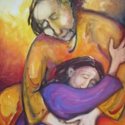
11.15.13 (Kislev 12, 5774) The following parable speaks of the hour of our need: A king's son was at a far distance from his father. Said his friends to him, "Return to your father." He said, "I can't: the way is too far. His father sent word to him and said, "Go as far as you are able, and I will come the rest of the way to you. Thus says the Holy One, blessed be He, to his faraway children: "Return to Me, and I will return to you."
שׁוּבוּ אֵלַי וְאָשׁוּבָה אֲלֵיכֶם
אָמַר יְהוָה צְבָאוֹת
shu·vu · e·lai · ve·a·shuv·ah · a·lei·khem
a·mar · Adonai · tze·va·ot

"Return to me, and I will return to you,
says the LORD of hosts" (Mal. 3:7)

Listen friends -- it is never too late to turn to God... The prophet Jeremiah spoke in the Name of the LORD: "Return, faithless Israel, declares the LORD. I will not look on you in anger, for I am kind (כִּי־חָסִיד אֲנִי), declares the LORD" (Jer. 3:12). When the people drew back in shame, however, God encouraged them by saying "My children, if you return, will you not be returning to your Father? Return, O faithless sons; I will heal your faithlessness. "Behold, we come to you, for you are the LORD our God."
Of course Yeshua illustrated the idea of teshuvah (i.e., תְּשׁוּבָה, "returning to God") by telling the great story of the "prodigal son" (Luke 15:11-32). After squandering his father's inheritance, a wayward son "came to himself" and decided to return home, full of shame and self-reproach. "But while he was still a long way off, his father saw him and was filled with compassion for him; he ran to his son, threw his arms around him and kissed him." The father then ordered a celebratory meal in honor of his lost son's homecoming. When his older brother objected, the father said, "We had to celebrate and be glad, because this brother of yours was dead and is alive again; he was lost and is found."
God sees you while you are still "a long way off" (Rom. 5:8). He runs to you with tender affection when you first begin to turn your heart toward Him... Indeed, his compassion is so great that He willingly embraces the shame of your sin and adorns you with "a fine robe, a ring, and sandals" - clothing befitting his name. Your loving Father even slaughters the "fattened calf" (Yeshua) so that a meal that celebrates your life may be served.
 |
Nerve of Forgetfulness...

[ The following entry is related to this week's Torah reading, parashat lach... ]
11.15.13 (Kislev 12, 5774) From our Torah this week (Vayishlach) we read: "This is why the people of Israel do not eat "gid ha'nasheh" - the sinew that passes along the hip socket - because the Angel struck Jacob's hip at its socket" (Gen. 32:32). Some of the sages associate this sinew with the carnal nature, with forces of earthiness and bodily desire, and that it why God wounded Jacob there. Others note that the term gid ha'nasheh (גִּיד הַנָּשֶׁה) literally means "nerve (or sinew) of forgetfulness," from the root word nashah (נָשָׁה) meaning to "forget" (see Gen. 41:51). Perhaps the prohibition not to eat this part of an animal was meant to symbolize that we must forget the carnal ways of our past to move forward in faith (Phil. 3:13-14).
Light in the Darkness...

11.15.13 (Kislev 12, 5774) Surely our great need is to have heart, to find strength, resolution, and steadfast determination to walk boldly during these heartless and depraved days (2 Tim. 3:1-5). We are not without God's help, of course. Yeshua told us that the Ruach HaKodesh (רוּחַ הַקּדֶשׁ) would be "called alongside" (παράκλητος) to comfort us on the journey. The English verb "comfort" literally means "to give strength" (from com- ["with"] and fortis ["strong"]), an idea similarly expressed by the verb "encourage," that is, to "put heart [i.e., 'core'] within the soul." In Hebrew, the word courage is expressed by the phrase ometz lev (אמֶץ לֵב), meaning "strong of heart," denoting an inner quality of the will rather than of the intellect. Ometz lev means having an inner conviction, a heartfelt passion, and a resolute hope. The sages say "the mind is the eye, whereas the heart is the feet." May God be our Light and Salvation as we walk through the surrounding darkness...
יְהוָה אוֹרִי וְיִשְׁעִי מִמִּי אִירָא
יְהוָה מָעוֹז־חַיַּי מִמִּי אֶפְחָד
Adonai · o·ri · ve·yish·i, · mi'mi · i·ra?
Adonai · ma'oz · chay·ai, · mi'mi · ef·chad?

"The LORD is my light and my salvation; whom shall I fear?
The LORD is the stronghold of my life; of whom shall I be afraid?"
(Psalm 27:1)

Download Study Card
The LORD humbled himself to be clothed with the flesh and bone of our exile so that we might know and trust him... Therefore ask him for the very best things - to move the largest of mountains, to bring to life the deadest of hearts, and to be set free to testify of his glory and love. We only have a short time to walk in faith before we will cross the veil and see. God can transform you; indeed, only God can save you from the peril of yourself. He has promised: "I will give you a new heart (לֵב חָדָשׁ), and a new spirit (רוּחַ חֲדָשָׁה) I will put within you; and I will remove the heart of stone (לֵב הָאֶבֶן) from your flesh and give you a heart of flesh" (Ezek. 36:26). May you receive God's promise for your soul, since His love and spirit are what you really need.
The Torah of Wrestling...

[ The following entry is related to this week's Torah reading, parashat Vayishlach... ]
11.14.13 (Kislev 11, 5774) "Not everyone who says to me, 'Lord, Lord,' will enter the kingdom of heaven, but the one who does the will of my Father who is in heaven. On that day many will say to me, 'Lord, Lord, did we not prophesy in your name, and cast out demons in your name, and do many mighty works in your name?' And then will I declare to them, 'I never knew you; depart from me, you workers of lawlessness'" (Matt. 7:21-23). Despite the practice and profession of their faith, these people were strangers to God... They had a false sense of assurance, believing that they were "serving God" while they really were not... So the essential question here is whether Yeshua truly knows you. You may know a lot about God, religion, spirituality, and yet you may remain unknown by him... Where do you find life? What are you loving? Where are you going?
"Not everyone who says to me, 'Lord, Lord,' will enter the kingdom of heaven, but the one who does the will of my Father who is in heaven" (Matt. 7:21). Yet what is the will of the Father but to trust in Messiah for life (John 6:40)? "What must we do, to be doing the works of God?" Yeshua answers: "This is the work of God, that you believe in the One whom he has sent" (John 6:28-29). The Torah of God centers on trusting the Messiah (Titus 3:5-7).
On that day many will say to me, 'Lord, Lord, did we not ... do many mighty works in your name?' And then will I say to them, 'I never knew you; depart from me, you workers of lawlessness' (Matt. 7:22-23). From this we see that good works - even those done in the name of Messiah - are insufficient for life, and that something more is needed... That "something more" is the reality of relationship with him. However, even Yeshua's sacrifice on the cross can't bring you into relationship with him apart from receiving it for your healing... By faith you encounter Yeshua clothed in your flesh, your sin, and suffering death for you. "As long as Christ remains outside of us we are separated from him."
Some people feel frightened when they consider all this, but fear arises only if we miss Yeshua's point... Good works can't save you, even those performed in the Savior's name... What saves you is trusting in God's great love for your life: "This is the work of God, to trust in the One whom God has sent [for you]" (John 6:28-29). Genuine salvation is "from the LORD," that is, comes as a result of his loving intervention on your behalf (Titus 3:5-7; Eph. 2:8-10). This is the will of the Father, the true Torah of the LORD, namely, to honor the Messiah and know him by faith... You trust him for eternal life, you believe that he bears your sins, you seek to know his heart, and you desire to share your life with him. It is lawlessness to reject the Torah of the LORD that commands us to follow Messiah and know him in all our ways - including the ways of our struggles, our fears, and so on... Each of us must wrestle alone, in the dark places of fear, to find our new name from God (Gen. 32:24). Is the blessing for you or not? The essential thing is to know (and more importantly) to be known by Yeshua.... It is a matter of trust, of sharing your heart, being real with him, walking with him, loving him... "This is the work of God, to trust in the One whom God has sent [for you]." Trusting God means accepting that you are loved (and safe) because of who God is.
The gospel is "the power of God for salvation to everyone who believes, to the Jew first and also to the Greek" (Rom. 1:16). It is a miracle of being in a right relationship with God. We are pursued by his love, and he haunts us until we surrender to his will... Like Jonah we first must be "swallowed up" in consciousness of our own rebellion before we realize we are undone, that we are without remedy apart from God's intervention and deliverance. We start there - in the "belly of the fish" - and later are resurrected to go forth by God's mercy and grace. As we look to Yeshua, as we lean on him, he reveals more of himself to us. He gives us the grace and strength we need; he is always enough...
Whether Yeshua is living in you (and you are living in Him) is the most important question of your life upon which everything else turns. The great mystery is "Christ in you, the hope of glory" (Col. 1:27). As Ravenhill once said, "I don't ask people if they're saved anymore; I look them straight in the eye and say, "Does Christ live inside you?" Indeed, He is present right now -- for you -- in this very moment... Are you connected with Him in the truth? Are you drawing life from His life? Do you really live in Yeshua? "God is making his appeal through us. We implore you on behalf of Messiah, be reconciled to God" (2 Cor. 5:20).
Each of us must wrestle alone, in the dark places of fear, to receive our new name from God (see Gen. 32:24). Again I ask: Is the blessing for you or not? Are you willing to be loved and accepted by him? What is your name? What do you call yourself? You cannot know God apart from his love, yet for some people that is exactly where the struggle lies... Look within your heart; test yourself; do you believe God cares for you? Take hold of the promise and do not let go until you know who you are in his love. "To the one who conquers I will give some of the hidden manna, and I will give him a white stone, with a new name written on the stone that no one knows except the one who receives it" (Rev. 2:17).
Repeat these affirmations of faith:
The blessing is there for you, though you might need to wrestle in faith to fully take hold of your identity in Christ. May God help you answer to the new name he calls out to you...
Inner Light of Faith...

[ Chanukah begins in two weeks, at sundown on Wednesday, Nov. 27th this year... ]
11.13.13 (Kislev 10, 5774) Allow the light of God's love to shine in you brightly. As Yeshua said, "Whoever has my commandments and keeps them, such is the one who loves me. And the one who loves me will be loved by my Father, and I will love him and will manifest myself to him" (John 14:21). Note that the Greek word for "manifest" means to "shine inside" (i.e., ἐμφανίζω, from ἐν, "in" and φαίνω, "shine"), indicating that the revelation would be inward light of the Divine Presence. The Hebrew word for "praise" (i.e., tehillah: תְּהִלָּה) comes from a verb that means "to shine" (i.e., halal: הָלַל), from which we derive the word "halo." Similarly, the word "aura" comes from the Hebrew word "ohr" (אוֹר), meaning "light." Let your inner light shine before others so that they may see your good works and give honor to your Father who is in heaven" (Matt. 5:16).
אֱלהִים יְחָנֵּנוּ וִיבָרְכֵנוּ
יָאֵר פָּנָיו אִתָּנוּ סֶלָה
E·lo·him · ye·chon·nei·nu · vi·var·khei·nu
ya·er · pa·nav · it·ta·nu · se·lah

"May God be gracious to us and bless us
and make his face to shine upon us, selah."
(Psalm 67:1)

Inner light comes from God: "God is light, and in him is no darkness at all." We "walk in the light," experiencing inner peace and joy in the Holy Spirit when we heed and obey the Voice of God's love and abide in the secret place of His Love. The people of God are united to one another by the power of God's love. O LORD God, "light up my eyes lest I sleep the sleep of death" (Psalm 13:3). May the light and love of our God shine within you, friends!
Reciprocity of Heart...

11.13.13 (Kislev 10, 5774) Self-hatred is a sin since the Torah says, "love your neighbor as yourself" (וְאָהַבְתָּ לְרֵעֲךָ כָּמוֹךָ). You don't have the right to abuse or despise yourself, since doing so contemns the divine image within you. You have a moral duty, then, to honor the miracle of your life and to extend this same honor to others who likewise are made in God's likeness. You cannot curse yourself because that wishes a curse upon others, for the very same reason. You must turn away from self-contempt and honor God's love for your life.
וְאָהַבְתָּ לְרֵעֲךָ כָּמוֹךָ אֲנִי יְהוָה
ve'a·hav·ta · le're·a·kha · ka·mo·kha: · a·ni · Adonai

"You shall love your neighbor as yourself: I AM the LORD"
(Lev. 19:18)

Note that the direct object of the verb (i.e., ahav - to love) is your "neighbor" (רֵעַ). But who, exactly, is my neighbor? Some have claimed that the word re'a (neighbor) refers only to one's fellow Jew or friend, and not to others at large in the world. However this is obviously false, since the "stranger" (ger) is explicitly identified to be an object of our love (see Lev. 19:34). And note that when Yeshua was asked this very question, he turning it around. Instead of attempting to find someone worthy of neighborly love, we are asked to be worthy and loving neighbors ourselves (Luke 10:29-37).
The divine reciprocity is always "like-for-like." God reveals Himself with the same character and in the same "mode" that we show to others; God relates to us as we relate to others: middah keneged middah (Luke 6:38). In this way, the LORD "amplifies" by redoubling our relationships, which thereby mirrors the nature our character to ourselves. This is perhaps why we sometimes "replay" the same mistakes in our lives. God keeps us wandering in the desert to help us confront who we are inside, who we really are, which then may awaken within us the desire for teshuvah... The LORD "renders to men according to their deeds" – not in a vindictive way, of course, but to help us understand the nature of our actions and to help us turn back to Him. Are you in need of mercy? Then be merciful to others... Do you want to experience more of God's love? Then show love to others... Are you in need of forgiveness? Then forgive others and regard them with honor and esteem. As you do unto others, so will be done unto you.
When God commands us to "love your neighbor as yourself," he graciously includes the addendum: "I AM the LORD," which the sages understood to mean, "I will help you to do this," or (in this case) "I will empower you through your acts of lovingkindness." Who can truly love his neighbor as himself? Who can love himself, for that matter, apart from the "I-AM-within-you always" presence of Yeshua that enables you to love?
 |
Abiding in Him...

11.13.13 (Kislev 10, 5774) Yeshua used the allegory of a vine and its branches to illustrate how we are to be spiritually connected to Him: "I am the true Vine, and you are the branches," he said (John 15:1-6). The purpose of the branch is to be a conduit of the life of the vine. We derive our identity, life and strength from being made part of Yeshua's life, His vision, and His purposes... In Hebrew, this idea is called devakut (דְּבָקוּת) which means "cleaving" to God bekhol-levavkha (בְּכָל־לְבָבְךָ), "with all your heart," and bekhol-nafshekha (בְּכָל־נַפְשְׁךָ), "with all your soul," and bekhol-me'odekha (בְּכָל־מְאדֶךָ), "with all your being..." Cleaving to God is the essence of the great commandment to love the Lord given in the Shema. We are able to so cleave to God in Yeshua because God does a miracle and gives us lev chadash, a new heart to serve Him. We love Him because He first loved us (1 John 4:19). Whether Yeshua is living in you (and you are living in Him) is the most important question of your life upon which everything else ultimately depends. He appeals to each heart of faith: "Live in me, and I will live in you" (John 15:4). May God help us to respond to the call!
 |
Raised from the Dust...
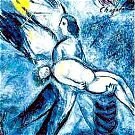
[ The following entry is related to this week's Torah reading, parashat Vayishlach... ]
11.13.13 (Kislev 10, 5774) In his appeal to God for help, Jacob prayed: "I have been diminished (קָטנְתִּי) by all the kindness and all the truth you have done for your servant" (Gen. 32:11). Jacob was "made small" through the revelation of God's love and truth, and the focus shifted away from himself to God: "He must increase, but I must decrease" (John 3:30). Jacob's subsequent wrestling with the angel pictured birth pangs, the throes of his spiritual rebirth. Rashi notes that the word translated "wrestled" (i.e., va'ye'avak: וַיֵּאָבֵק, Gen. 32:24) is related to the idea of "raising the dust" (i.e., avak: אָבָק), which suggests resurrection from the dust. The struggle – the deathmatch – was to bury old Jacob and to raise him up as "Israel," a prince of God the King.
Yeshua told us we must "forget ourselves" in order to discover what really matters: "If anyone would come after me, let him deny himself and take up his cross and follow me. For whoever would save his life will lose it, but whoever loses his life for my sake will find it" (Matt. 16:24-25). Note that the phrase translated "deny himself" comes from a Greek verb (ἀπαρνέομαι) that means "to affirm that you have no acquaintance or connection with someone," and is the same verb used when Peter denied the Messiah (from α-, "not," + ῥέω, "to speak"). To deny yourself, then, means to be willing to disregard your own personal interests in a given moment -- to "betray" the selfish impulse that seeks to rule the ego in your daily life. It is a "putting off" of the old nature and a "putting on" of the new (Eph. 4:22-24). Put positively, denying yourself means "forgetting yourself" because you are overwhelmed with God's great love for your soul, and therefore you no longer "know yourself" according to the flesh but according to the Spirit of God (2 Cor. 5:16-17).
Reconciliation and Atonement...
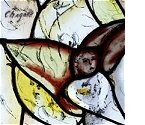
[ The following entry is related to this week's Torah reading, parashat Vayishlach... ]
11.12.13 (Kislev 9, 5774) During Jacob's dream of the ladder (Vayetzei) the LORD described Himself as the "God of Abraham your father" and then added, "and the God of Isaac" (Gen. 28:13). In his prayer for God's help before returning home, however, Jacob elevated his relationship to Isaac by praying to "the God of my father Abraham and the God of my father Isaac (וֵאלהֵי אָבִי יִצְחָק), the LORD who said to me, 'Return...'" (Gen. 32:9). This change is significant because Jacob was returning to confront not only his difficult past with Esau, but the wound he caused his father's heart (and to mourn the loss of his mother, too)... But notice that Jacob's attitude had undergone a profound transformation. When he was younger, Jacob was willing to deceive his own father and to "grapple" the advantage from his brother, but now he was a broken man who understood that he was entirely unworthy to receive God's blessing: "I am not worthy of the least of all the deeds of steadfast love (chesed) and all the faithfulness (emet) that you have shown to your servant" (Gen. 32:10). In Torah scrolls, the Hebrew word katonti (קָטנְתִּי), translated as "I am unworthy," is written with a diminished Tet (ט) to show the humility of Jacob. Jacob no longer felt "entitled" to receive God's favor, though he was conscious of it nonetheless. He was now addressing his prayer to the LORD (יהוה) rather than to God (אֱלהִים), indicating that he first sought the compassion of God instead of God's justice.
Note: For more on this subject, see "Reconciliation and Atonement" here.
 |
Let God be Magnified...
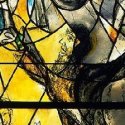
11.12.13 (Kislev 9, 5774) "May all who love your salvation say continually, 'Let the LORD be magnified'" (Psalm 40:16). To magnify God means to honor God as God; it means that in the short span of time alloted to us, in the midst of our struggles, our pains, our temptations, and our sins, we let the LORD God reign in our hearts and souls; we esteem His presence in our thoughts and in our conscience, and we surrender to his reality. God always answers the groaning of the heart. As we yield to God's presence and grace in all we do, we declare his greatness and magnify His Name.
יָשִׂישׂוּ וְיִשְׂמְחוּ בְּךָ כָּל־מְבַקְשֶׁיךָ
יאמְרוּ תָמִיד יִגְדַּל יְהוָה אהֲבֵי תְּשׁוּעָתֶךָ
ya·si·su · ve'yis·me·chu · be·kha · kol · me'va·ke·she·kha
yo·me·ru · ta·mid · yig·dal · Adonai · o·ha·vei · te·shu·a·te·kha

"May all who seek you rejoice and be glad in you! and may those
who love your salvation say continually, 'Let the LORD be magnified!'"
(Psalm 40:16)

Of course we are not without comfort as we magnify the LORD; we praise him for the victory we experience in Yeshua our Savior and our great hope, even as we sojourn this age...
A Chosen Ignorance...

11.12.13 (Kislev 9, 5774) Dietrich Bonhoeffer, who was surrounded by the evil of Nazi Germany, regarded stupidity as more dangerous than outright evil, since stupidity is a type of irrationality, a chosen ignorance of what is real and true. Against such willed ignorance we are often defenseless, since any reasoning that appeals to transcendental moral truth finds no traction, carries no weight, and has no effect. The devil, then, seeks first of all to stupefy people, that is, to flatter and persuade them that there is no need for them to engage in serious thinking or to humbly question their assumptions... As William James observed: "A great many people think they are thinking when they are merely rearranging their prejudices." The antidote to unthinkingly accepting the biases and inculcated prejudices of the world is to be awakened to the reality of God: "The fear of the LORD is the beginning of knowledge; but fools despise wisdom and correction" (Prov. 1:7).
יִרְאַת יְהוָה רֵאשִׁית דָּעַת
חָכְמָה וּמוּסָר אֱוִילִים בָּזוּ
yir·at · Adonai · rei·shit · da·at
chokh·mah · u'mu·sar · e·vi·lim · ba·zu

"The fear of the LORD is the beginning of knowledge;
but fools despise wisdom and correction."
(Prov. 1:7)

The ground of all right thinking about reality is "wonder," or the sense that life itself is something mysteriously beautiful, amazing, and therefore inherently sacred. This is sometimes called yirat Adonai (יִרְאַת יְהוָה), "the fear of the LORD" that leads to wisdom. Right thinking therefore begins with consciousness of the good (הַכָּרַת טוֹבָה), that is, with an awareness that life itself a gift, a mystery, and a hallowed question... We seek our origin, our essence, and our purpose -- and in our seeking we seek the LORD. We long for deliverance from what keeps us from healing, from love, from real hope. And as we seek, the wonder of the LORD God never ends. As Yeshua said, "Ask, and it will be given to you; seek, and you will find; knock, and it will be opened to you" (Matt. 7:7).
Telling God your name...

[ The following entry is related to this week's Torah reading, parashat Vayishlach... ]
11.11.13 (Kislev 8, 5774) Some people make it the business of theology to know God's Name, but God begins by first asking for our name instead... Recall that Jacob had disguised who he really was in the hope of obtaining the blessing (Gen. 27), though his duplicity forced him into an exile that lasted until he was finally willing to be honest with himself. And like Jacob, each of us must answer God's question: "What is your name?" (Gen. 32:27). When we "wrestle through" this question to face who we really are, we encounter God and find our blessing, that is, our true identity. Each of us has to go through the process of being renamed from "manipulator" (i.e., Yaakov) to "one in whom God rules" (i.e., Israel). But note the order: it is only when we "tell God our name," that is, own who we really are, that He meets with us "face to face" (Gen. 32:30). You will not be able to say, "I will not let you go unless you bless me," until you are willing tell God your name (Gen. 32:26-27).
I should add that while "telling God your name" can be painful and even frightening, it is not the last word about who you really are. We are faced with an inner dualism as we struggle to take account of our lives. On the one hand, we need to confess the truth of our sinfulness, brokenness, and so on, while on the other we must endure ourselves and find faith that God's blessing nevertheless belongs to us, despite the mess we've made of our lives.... We have to be willing to accept God's new name for us and to believe that God will miraculously transform our inner nature for good. We are renamed from Yaakov to Israel, though we still know ourselves as both. Jacob was renamed "Israel" but afterward he walked with a limp, seeing both the new and the old natures within him. Jacob still struggled, though his struggle was now focused on walking as God's beloved child in this world: the limp was given to help him lean on the Lord for support.
Note: Some people may need help learning to "endure themselves." Many are able, it seems, to receive the hope that they are forgiven for their past sins, but they are subsequently scandalized by encountering their own inner struggles, and they eventually despair over their ongoing weakness... Tragically, some are even tempted to regard the warfare within the heart as a sign of being devoid of all saving grace! We must remember, however, that there is a real struggle between the desires of the flesh and the desires of the Spirit (Gal. 5:17). We must never move away from simple trust in the message of God's unconditional love demonstrated at the cross; we must never seek to legitimize our place in God's heart. When we walk by the Spirit, we are no longer under the law (Gal. 5:18), which is to say, we no longer need to justify ourselves but instead trust in God's power to transform us. Just as we are saved by the love of God, so are we changed, so do we grow...
 |
God-Wrestling and Faith...

[ The following entry is related to this week's Torah reading, parashat Vayishlach... ]
11.11.13 (Kislev 8, 5774) Before he could return from his exile, Jacob had to face his fears and wrestle with God. The outcome of the struggle was a blessing, as signified by a new name, "Israel" (יִשְׂרָאֵל), meaning one who who perseveres (שָׂרָה) with God (אֵל). Jacob finally prevailed with God when the power of his faith overcame the pain of his past... Jacob's story teaches that before we can return from our place of exile, we have to face our fears and wrestle over who we really are. Each of us must be renamed from Jacob to Israel, from being a manipulator to one who surrenders to God's power and blessing. Just as Jacob finally prevailed with God when the power of his faith overcame the pain of his past, so we can escape from our own exile - the prison of our past - by proclaiming from the heart: "I have seen God face to face, and yet my life has been delivered" (Gen. 32:30).
The prophet Hosea adds some further insight about Jacob's great struggle of faith and how it eventually led to the revelation of God at Bethel:
וָיָּשַׂר אֶל־מַלְאָךְ וַיֻּכָל בָּכָה וַיִּתְחַנֶּן־לוֹ
בֵּית־אֵל יִמְצָאֶנּוּ וְשָׁם יְדַבֵּר עִמָּנוּ
וַיהוָה אֱלהֵי הַצְּבָאוֹת יְהוָה זִכְרוֹ
vai·ya·sar · el · mal·akh · vai·yu·chal · ba·khah · vai·yit·cha·nen · lo
bet · el · yim·tza·e·nu · ve·sham · ye·da·ber · im·ma·nu
va·do·nai · E·lo·hei · ha·tze·va·ot · Adonai · zikh·ro

"Yes, he [Jacob] fought with the Angel and won; he wept and pled with Him.
He found Him at Bethel, and there He spoke with us;
even the LORD, the God of hosts; the LORD is His memorial."
(Hosea 12:4-5)

Jacob "wept and made supplication" to the Angel, a fact left unmentioned by Moses' account in the Torah, though perhaps hinted at in Jacob's prayer before the climactic conflict: "I am not worthy of the least of thy tender mercies..." (Gen. 32:10). This shows that the struggle was spiritual, not physical, and that Jacob finally "won" the fight by paradoxically submitting himself to God... The injured thigh was a token of Jacob's surrender to the Angel (Gen. 32:25, 31), and it was only after his flesh was wounded that Jacob's life was empowered by God to take hold of the realm of promise, as signified by his return to Bethel... The story is ultimately about death and resurrection: Ultimately, Israel was wounded so that he could know that the LORD "gives power to the faint, and to them that have no might, he increases strength" (Isa. 40:29).
Notice that Jacob continued to wrestle until he was injured by the Angel of the LORD, after which he simply "hung on" for dear life until he received the blessing directly from God. In other words, Jacob discovered that struggling and resisting God were useless for the blessing to be secured, so he simply yielded in submission.... This was the turning point of his life, the moment when his new name and identity were bestowed. The LORD surely could have overpowered Jacob, but it took far more for Jacob to freely surrender his will. In the end, the New Testament attests to change that issued from Jacob's brokenness: Despite some additional struggles he later faced with the flesh, he was finally able to die with the blessing of God to impart to his children (Heb. 11:21).
And may God help us fight the good fight of faith - and prevail!
 |
Parashat Vayishlach...

[ The following entry is related to this week's Torah reading, parashat Vayishlach... ]
11.10.13 (Kislev 7, 5774) Our Torah portion this week contains the famous account of how Jacob "wrestled" with the Angel of the LORD just before he encountered his estranged brother Esau. During the "grappling" session (recall the meaning of Jacob's name), the Angel injured Jacob's thigh, but Jacob refused to release his hold until he received the blessing (הַבְּרָכָה). The LORD then asked him, "What is your name (מַה־שְּׁמֶךָ)?" And he said, "Jacob" (i.e., Ya'akov: יַעֲקב). The Angel then replied, "Your name shall no longer be Ya'akov ("heel holder" [of Esau]) but Yisrael ("contender with God"), for as a prince (i.e., sar: שַׂר) you have contended (i.e., sarita: שָׂרִיתָ) with God and with men and have prevailed" (Gen. 32:28). Jacob finally prevailed with God when he refused to let his past determine his spiritual status and destiny... He overcome the pain and shame of his past through faith...
Similarly, each of us must "go to Peniel" to wrestle with the Angel; each of us must be renamed from Ya'akov ("a supplanter") to Israel ("a prince with God"). When the Spirit of Truth asks, "What is your name," may the LORD God grant you the courage to refuse to "let go" until you receive the divine blessing of love and acceptance...
Note: For more information, please read the Torah summary page for Vayishlach and its related articles. You can also download the Shabbat "Table Talk" for the portion here:
Prayers in the dark...

11.08.13 (Kislev 5, 5774) "I believe that you have full power and authority over the world and its evil, Lord, but I am unsure how that operates in light of its seeming absence.... You stop the mouth of lions, yet the lion's den is present; you heal the sick, yet we bury our dead; you say we are saved, yet much within us remains broken... My faith tries to see beyond the pale of this temporal world and its shadows, yet I am still bound by it, still subject to its vanity, still in a place of exile. When I look for you here, in this moment, I find my heart homesick and yearning; I seek your face... I call you father but I feel orphaned in this world... It is not why I suffer that I want to know, Lord, but whether I suffer for you."
"Though the fig tree should not blossom, nor fruit be on the vines, the produce of the olive fail and the fields yield no food, the flock be cut off from the fold and there be no herd in the stalls, yet I will rejoice in the LORD; I will take joy in the God of my salvation (אֱלהֵי יִשְׁעִי), literally, "God my Jesus" (Hab. 3:17-18). Come alive, O heart of faith!
 |
Lord of this Moment...

11.08.13 (Kislev 5, 5774) God's Name is "I-AM-with-you-always," Immanuel (עִמָּנוּ אֵל) - always in the midst of you, your heart, your Center... The LORD is named this way because he is never without his own, and we are who we are in relation to his presence in our lives. Yeshua is not simply the Lord of the past or the Lord of the future, but the Lord of this moment, this "here" and this "now." He is the same yesterday, today, and forever - the breath of life, our sustaining hope. Whatever else may come of this day, this is the day that the LORD has made, the day of the Living Lord Yeshua our Savior.
Shepherd in Darkness....

11.08.13 (Kislev 5, 5774) "Yea, though I walk through the valley of the shadow of death, I will fear no evil..." (Psalm 23:4). O God of Light, Light of the world, surely You know my need for light as I look to You, especially when darkness tries to extinguish my hope. Despite my inability to see you now, help me to know that you are with me; let "thy rod and thy staff comfort me" and lead me closer to you. Lord, when I am afraid, quicken the faith you have put within my heart. Be Thou my Shepherd through the darkness, O Lord my God...
גַּם כִּי־אֵלֵךְ בְּגֵיא צַלְמָוֶת
לא־אִירָא רָע כִּי־אַתָּה עִמָּדִי
שִׁבְטְךָ וּמִשְׁעַנְתֶּךָ הֵמָּה יְנַחֲמֻנִי
gam · ki · e·lekh · be·gei · tzal·ma·vet
lo · i·ra · ra, · ki · at·tah · im·ma·di
shiv·te·kha · u·mish·an·te·kha · hem·mah · ye·na·cha·mu·ni

"Even though I walk through the valley of the shadow of death,
I will fear no evil, for You are with me;
Your rod and your staff, they comfort me"
(Psalm 23:4)

"Be not afraid." Over and over again in the Scriptures we hear the LORD saying to those who trust in Him, al-tirah, "be not afraid." Nachman of Breslov is reported to have once said, "All the earth is a very narrow bridge (כָּל־הָעוֹלָם כֻּלּוֹ גֶּשֶׁר צַר מְאד), and the point of life is never to be afraid." Likewise we trust Yeshua to be the Bridge to the Father, the narrow way of passage that leads to everlasting life. He calls out to us in the storms of this world, "Take heart. It is I; be not afraid" (Matt. 14:27). The heart of faith senses the LORD's presence, even in the darkness, and hears the Spirit saying, "I am with you..."
I do not see the road ahead of me, I cannot know for certain where it will end. Nor do I really know myself, and the fact that I think I am following your will does not mean I am actually doing so. But I believe the desire to please you does in fact please you, and I hope I have that desire in all that I am doing. I hope that I will never do anything apart from that desire. And I know that if I do this you will lead me by the right road, though I may know nothing about it. Therefore, I will trust you always, though I may seem to be lost and in the shadow of death. I will not fear, for your are ever with me, and you will never leave me to face my perils alone. - Thomas Merton
In times of testing, how we desperately do we need a sense of companionship and intimacy with the Lord! When you feel abandoned, ashamed, or alone; or when you are afraid and unsure of yourself; or when pain distances you from others, nudging you to isolation or loneliness, then may God's Spirit brood over you, whispering your name, reminding you that you are never alone, and that God Himself is forever for you, despite yourself. Therefore "fear no evil," because God is with you in the midst of your present darkness. As it is written: "Surely goodness and love shall pursue you all the days of your life, and you shall dwell in the house of the LORD forever" (Psalm 23:6). Come alive, O heart of faith!
Note: You prayers for this ministry are deeply and sincerely appreciated, friends...
Distilling of Heart...

11.07.13 (Kislev 4, 5774) Brokenness distills the intentions of the heart by helping us to be more honest with ourselves. We begin to realize that we are more vulnerable than at first we thought; that our faith is not as strong as we imagined, and that our motives are often mixed and unconscious. Illusions are striped away; idols crumble; deeper levels of selfishness are uncovered; the gap between our words and our deeds is exposed... It is one thing, after all, to intellectually think about faith or to idealize spirituality, but it is quite another to walk out faith in darkness. Yet it is only there, in the rawness of heart, that we discover what we really believe and how our faith makes traction with reality...
Take hope, struggling one. It is surely the will of God for you to find strength in weakness and comfort in affliction. As our Scriptures say, God is "the Father of Mercies and God of all comfort" (אַב הָרַחֲמִים וֵאלהֵי כָּל־נֶחָמָה), and the Lord "comforts us" (lit., "calls us to His side," παρακαλέω) in our afflictions so that we may be able to comfort those who are afflicted with the same comfort with which we ourselves are comforted by God (2 Cor. 1:3-4).
 |
Awakening to Awe...
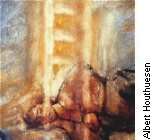
[ The following is related to this week's Torah reading, Parashat Vayetzei... ]
11.06.13 (Kislev 3, 5774) "Then Jacob awoke from his sleep and said, 'Surely the LORD is in this place, but I did not know it'" (Gen. 28:16). Jacob had been asleep but was jarred awake. He found himself in awe, sensing the presence of the gateway to heaven. The sages note the grammar here is emphatic, suggesting that Jacob said: "Surely the LORD is in this place -- but am I (וְאָנכִי)? I do not know! (לא יָדָעְתִּי). Jacob had awakened from his dream to realize that he had been dreaming his life away, living in a fantasy world. God is present in this place – but am I? Have I awakened to be present before God?
All religious reality begins with what biblical religion calls the 'fear of God.' It comes when our existence between birth and death becomes incomprehensible and uncanny, when all security is shattered through the mystery. This is not the relative mystery of that which is inaccessible only to the present state of human knowledge and is hence in principle discoverable. It is the essential mystery, the inscrutableness of which belongs to its very nature... Through this dark gate (which is only a gate and not, as some theologians believe, a dwelling) the believing man steps forth into the everyday which is henceforth hallowed as the place in which he has to live with the mystery. He steps forth directed and assigned to the concrete, contextual situations of his existence. That he henceforth accepts the situation as given him by the Giver is what Biblical religion calls the 'fear of God.' - Martin Buber, Eclipse of God
An honest theology must find a place for mystery, for "seeing through a glass darkly," and for the apprehension of awe and wonder. Philosophy (not science) asks the question: "Why is there something rather than nothing at all?" This is a question regarding the "why" of existence itself, the profusion of life as it surrounds us. Is there a reason for existence, a purpose, a direction, a radical meaning? Faith "sees what is invisible" by experiencing reality as revelation: the mystery of life points beyond itself to God's creative and sustaining presence: "In Him we live and move and have our being" (Acts 17:28; Rom. 1:20). Cut open a seed and what do you see, but "the hidden power that makes the fruit grow toward the sky." Likewise what is most real about us is shrouded in profound mystery. We are finite, our lives are short and bounded by darkness, yet we sense God's Spirit, the hidden power that upholds our souls, and we trust that we will indeed live forever because of God's love. As theologian Paul Tillich wrote: "The question of being is not the question of any specific being, its existence and nature, but it is the question of what it means to be. It is the simplest, most profound, and absolutely inexhaustible question – the question of what it means to say something is. The word "is" hides the riddle of all riddles, the mystery that there is anything at all." Though we might try to explain God by way of logic and doctrine, in the end it is the mystery of "Messiah in you - the hope of glory."
When God said, "Let there be light, and there was light" (Gen. 1:3), He seemed to put on light as a robe of the Divine Majesty and Kingship: He wrapped Himself with radiance as a tallit gadol... Da lifnei mi attah omed (דַּע לִפְנֵי מִי אַתָּה עוֹמֵד) – "Know before whom you stand." The whole earth is lit up with God's glory, and every bush of the field is aflame before us -- if we have eyes to see (Isa. 6:3). May it please the LORD to open our spiritual eyes so that we can behold more of His glory and majesty in this hour... Amen.
 |
The Meeting Place of God...

[ The following is related to this week's Torah reading, Parashat Vayetzei... ]
11.05.13 (Kislev 2, 5774) In our Torah portion this week (Vayetzei), it is written that Jacob "came to a certain place and stayed there that night" (Gen. 28:11). The Hebrew text, however, indicates that Jacob did not just happen upon a random place, but rather that "he encountered the place" -- vayifga ba'makom (וַיִּפְגַּע בַּמָּקוֹם). Since the Hebrew word makom ("place") comes from a verb that means "to arise" or ascend (i.e., קוּם), the vision of the ladder pictures Yeshua, the one who would "descend" (as the Son of Man) and would "rise" (as the resurrected LORD) to be our Mediator before God. Indeed the Hebrew word for "intercessor" (i.e., mafgia: מַפְגִּיעַ) comes from the same verb (paga') mentioned in our verse (see also Isa. 59:16). Yeshua is our Intercessor who makes "contact" with God on our behalf. Through His sacrifice for our redemption upon the cross (i.e., his greater Akedah), Yeshua created a meeting place (paga') between God and man.
Jacob's profound vision of the ladder pictures the mysterious contact between heaven and earth – the intersection between the natural and supernatural realms, and in that sense it is a metaphor of the incarnation: the Infinite One closed in the finite, made tangible, visible, the "word made flesh." God's word to us must always be so clothed, since it speaks across the chasm to be heard within the bounds of creation, yet it remains mysterious, wonderful, full of hidden and divine glory. In Yeshua, heaven is opened and the angels of God ascend and descend (John 1:51).
Note: For more on this subject, see "Jacob's Dream of Messiah."
 |
The Ladder of Truth...

11.05.13 (Kislev 2, 5774) The Hebrew idea of "truth" (i.e., emet: אֱמֶת) is richer than accurate factual description, since it also contains moral implications: what is true is also right, good, reliable (honest), beautiful, and sacred. The Hebrew word itself comes from a verb (aman) that means to "confirm" or establish. The noun emunah (i.e, אֱמוּנָה, "faithfulness" or "trustworthiness") comes from this root, as does the familiar word "amen," which expresses the will to live by what is ratified, since truth that is not lived is not truth. Indeed speaking the truth (dibbur emet) is considered foundational to moral life, as it says: "Speak the truth (דַּבְּרוּ אֱמֶת) to one another; render true and perfect justice in your gates" (Zech. 8:16). Yeshua repeatedly said, "Amen, Amen I say to you...." throughout his teaching ministry to stress the reliability and certainty of God's truth (Matt. 5:18, 26, etc.). Indeed, Yeshua is called "the Amen, the faithful and true witness" (Rev. 3:14).
The ancient Greek word translated "truth" is aletheia (ἀλήθεια), a compound formed from an alpha prefix (α-) meaning "not," and lethei (λήθη), meaning "forgetfulness." Greek scholars say the word lethei itself derives from the verb lanthano (λανθάνω), which means "to be hidden," so the general idea is that a-letheia (i.e., truth) is non-concealment, non-hiddenness, or (put positively) revelation or disclosure. Thus the word of Yeshua - His message, logos (λόγος), revelation, and presence - is both "unforgettable" and "irrepressible." Yeshua is the Unforgettable One that is manifest as the express Word of God (דְּבַר הָאֱלהִים). He is the Light of the world (אוֹר הָעוֹלָם) who imparts the "light of life" (John 8:12). Though God's message can be supressed by evil and darkened thinking, the truth is regarded as self-evident and full of intuitive validation (see Rom. 1:18-21).
Note that the LXX (i.e., the ancient Greek translation of the Torah and OT otherwise known as the Septuagint) dates from the time of Plato, though of course the Hebrew text dates back to the time of Moses (13th century BC) and even earlier. About 300 BC, "Theophrastus," a student of Aristotle, wrote of the Jews that 'being philosophers by race, they converse with each other about the Divine." Abraham, who dates from about 2,000 BC, was the first avowed monotheist who openly repudiated the polytheism and idolatry of ancient Ugaritic culture (Abraham long predates the rise of Hinduism and the animistic hymns of the Vedas and their priestly commentary found in the Upanishads by a thousand years). Similarly, both David and his son Solomon (10th century BC) wrote "existential" works of philosophy, predating the modern world by nearly 3,000 years...
Regarding Jacob's famous dream, the sages ask: "When is the man lower on the ladder higher than the man who is higher on the ladder? When the lower one is climbing up and other higher one is descending down..." Or as Kierkegaard put it, the way is "how." How you focus determines the direction you are taking. So where is your focus? Are you looking to God for help, for strength, and the ability to draw close to him, or are you looking to your own strength, direction, and will?
 |
Truth and Passion...

11.05.13 (Kislev 2, 5774) During the End of Days (אַחֲרִית הַיָּמִים) people will have a "form" (μόρφωσιν) of godliness but will deny its inner power, since their hearts will be turned away from the truth: "And because lawlessness (i.e., ἀνομία, lit. a=without; nomos=Torah) will be increased, the love of many will grow cold" (Matt. 24:12). In this connection we note that the Hebrew word for "falsehood" (or "lie") is sheker (שֶׁקֶר), which can also be read as she-kar (שֶׁקַר), meaning "that which" (-שׁ) makes you cold (קַר). The truth of God can't be known apart from passion, inner fire, desire. Indeed, the Hebrew word for "sin" (חֵטְא) means "missing the mark," though that essentially means missing the revelation of God's glory because lesser fears deaden the heart and cool the passion for the truth... Let us ask the LORD to rekindle the fire within our hearts!
"Be still and know that I am..." Prayer is a type of listening (shema), a turning back to heed the message of God's love and hope in Messiah. Indeed, the word "teshuvah" (תְּשׁוּבָה), often translated as "repentance," also means an answer or response to a question. God's love is the question, and the heart's response is the answer. Some of us may find it difficult to trust, to open our heart to receive grace and kindness. For those of us wounded by abandonment, it can be a great struggle to hear the voice of God calling you "beloved," "worthy," "valued," and "accepted." When you find faith to receive God's word of love, however, your heart comes alive and you begin to heal...
 |
Despite the Darkness...

11.04.13 (Kislev 1, 5774) It is dangerous to assume that someone who is walking in spiritual darkness must necessarily be outside of God's will, or that such a person is being punished by God. That sort of thinking, after all, was behind the old "karma-based" theology delivered to Job by his "religious" friends... On the contrary, as Charles Spurgeon reminds us, "Spiritual darkness of any sort is to be avoided and not desired; and yet, surprising as it may seem to be, it is a fact that some of the best of God's people frequently walk in darkness; some of them are wrapped in a sevenfold gloom at times, and to them neither sun, nor moon, nor star appears. As the pastor of a large church, I have to observe a great variety of experiences, and I note that some of whom I greatly love and esteem, who are, in my judgment, among the very choicest of God's people, nevertheless, travel most of the way to heaven by night." Indeed, how can God "wipe away our tears" if we never allow ourselves to cry, to feel pain? Despite the ambiguity of life in this world, faith "hopes against hope" that the LORD God will bring everlasting healing to us all; it is a "good fight," but it is a fight nonetheless. Yeshua himself entered into darkness for our sake, and he sometimes has his followers go there, too. As it says, "Let him who walks in darkness and has no light trust in the Name of the LORD (יִבְטַח בְּשֵׁם יְהוָה) and rely on his God."
מִי בָכֶם יְרֵא יְהוָה שׁמֵעַ בְּקוֹל עַבְדּוֹ
אֲשֶׁר הָלַךְ חֲשֵׁכִים וְאֵין נגַהּ לוֹ
יִבְטַח בְּשֵׁם יְהוָה וְיִשָּׁעֵן בֵּאלהָיו
mi · va·khem · ye·rei · Adonai · sho·mei·a · be·kol · av·do?
a·sher · ha·lakh · cha·she·khim · ve·ein · no·gah · lo?
yiv·tach · be·Shem · Adonai · ve·yi·sha·en · be·lo·hav

"Who among you fears the LORD and obeys the voice of his servant?
Let him who walks in darkness and has no light
trust in the Name of the LORD and rely on his God."
(Isa. 50:10)

Trusting in God (i.e., bittachon - בִּטָּחוֹן) does not mean that we are obligated to affirm that this is "the best of all possible worlds," though it does mean we believe that eventually God will wipe away every tear and make all things right... Bittachon is a word for this world, which says, "Though he slay me, I will trust in him..." Those who call upon the LORD can trust not only in concealed good behind ambiguous appearances ("all things work together for good") but also in a future, real, substantive good that will one day be clearly manifest for us all... We fight the "good fight" of faith, which is a worthy struggle that eventually is realized for blessing. Meanwhile, may the LORD our God keep us from such depth of sorrow that leads to sickness, darkness and despair.
If you ask for bread, your heavenly Father will not give you a stone... Only God can give to us the love for him that he fully knows we so desperately need; only God can deliver us from our "disordered loves" to take hold of what is truly essential. All we can do is ask, and keep on asking - even as we struggle on, despite ourselves... And we often revisit our sins over and over until we become "sick of our sickness," that is, until we begin to understand what our heart really needs. It's as if we are constantly being asked, "Is this what you want?" and our choices confess the truth... Only God does the miracle of real change within the human heart - only God can give life from the dead!
 |
Jacob's Dream of Messiah...

[ The following is related to this week's Torah reading, Parashat Vayetzei... ]
11.04.13 (Kislev 1, 5774) The revelation at Sinai and Jacob's vision of the ladder share something in common. Just as Yeshua was the "Voice of the Living God (קוֹל אֱלהִים חַיִּים) speaking (davar) from the midst of the fire" at Sinai (Deut. 5:26), so He was the Ascended LORD standing above the ladder speaking the word of promise (Gen. 28:12-15). In this connection we note that the words for "ladder," (i.e., sullam: סֻלָּם), "voice" (i.e., kol: קל), and "Sinai" (סִינָי) have the same numerical value, which suggests a connection between the two great visions. Yeshua is the Ladder to God, the means by which the Living Torah both descends and ascends for the sake of our deliverance (John 1:51). The "ladder of Sinai" is not meant for us to ascend but rather is for the LORD our Savior to descend and ascend on our behalf. Yeshua is the way, the truth, and the life (הדֶּרֶךְ וְהָאֱמֶת וְהַחַיִּים): no one can draw near to the Heavenly Father apart from Him (John 14:6).
Note: For more on this subject, see "Jacob's Dream of Messiah."
 |
Don't Trade your Birthright!
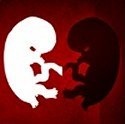
11.03.13 (Cheshvan 30, 5774) "And he sold his birthright..." (Gen. 25:33). Every one is born with a birthright that the devil seeks to barter for a moment of instant gratification. The essence of idolatry is to absolutize the moment, to seize it with insatiable hunger. The devil offers the soul the "fatness of the earth" in place of the desire for the "dew of heaven." The true blessing from heaven is to find your identity as God's child, as an "heir according to promise." Therefore Jacob was blessed first with "the dew of heaven" and then the "fatness of the earth" (Gen. 27:28), but the blessing given to Esau was just the opposite: first "the fatness of the earth" and then the "dew of heaven" (Gen. 27:39).
Parashat Vayetzei - וַיֵּצֵא
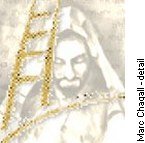
11.03.13 (Cheshvan 30, 5774) Our Torah portion this week includes Jacob's dream of a ladder (סֻלָּם) extending from earth to heaven, with the angels of God ascending and descending, and the LORD Himself standing above assuring Jacob of his safe return to the land he had fled. Jacob awoke and responded to the dream with awe: "Surely the LORD is in this place (בַּמָּקוֹם הַזֶּה), and I did not know it." And he was afraid and said, "How awesome is this place! This is none other than the house of God, and this is the gate of heaven." And he called the name of that place Bethel (בֵּית־אֵל) i.e., "the house of God."
The sages explain that ha-makom (הַמָּקוֹם), literally "the place" that Jacob saw, was actually Mount Moriah, the location where Jacob's father Isaac was bound as the "sacrificed seed" and which later became the site of the Holy Temple. The word makom comes from a verb (קוּם) meaning "to arise," suggesting resurrection and ascension. In later Rabbinical thought Ha-Makom became synonymous with the name of God Himself ("God is the place of the world, but the world is not God's only place").
Yeshua referred to Jacob's dream when he said, "Truly, truly, I say to you, you will see heaven opened, and the angels of God ascending and descending on the Son of Man" (John 1:51). Just as Jacob saw the ladder ascending to heaven with the angels of God ascending and descending upon it, so Yeshua told Nathanael that He was the Ladder to God, the sha'ar ha-shamayim (שַׁעַר הַשָּׁמָיִם) - the way into heaven (John 14:6). Indeed, Yeshua is the true Place or "house of God" and its Chief Cornerstone (Rosh Pinnah, Matt. 21:42). The LORD is the resurrection and life, the One who prepares a place for you (John 11:25; 14:2).
For more information, please read the Torah summary page for Vayetzei and its related articles. You can also download the "Table Talk" for the portion here:
Rosh Chodesh Kislev
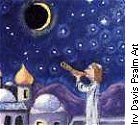
11.01.13 (Cheshvan 29, 5774) On the Biblical calendar the month of Kislev (כִּסְלֵו) is the ninth of the year (counting from Nisan), and it is also one of the "darkest" of the year, with the days progressively getting shorter and the nights getting longer. Indeed, the Winter Solstice generally occurs during the last week of Kislev, and therefore the week of Chanukah (which straddles the months of Kislev and Tevet) often contains the longest night of the year (and even during "leap years," when the solstice occurs a bit later, there is always a new moon during the season of Chanukah). It is no wonder that, among other things, Chanukah represents an appropriate time to kindle the lights of faith - and to remember the Light of the World in the Messiah's advent to earth...
יְהִי רָצוֹן מִלְּפָנֵיךָ יהוה אֱלהֵינוּ וֵאלהֵי אֲבוֹתֵינוּ
שֶׁתְּחַדֵּשׁ עָלֵינוּ חדֶשׁ טוֹב בַּאֲדנֵינוּ יֵשׁוּעַ הַמָּשִׁיחַ אָמֵן
ye·hi · ra·tzon · mil·fa·ne·kha · Adonai · E·lo·hei·nu · ve·lo·hei · a·vo·tei·nu
she·te·cha·desh · a·lei·nu · cho·desh · tov · ba'a·do·nei·nu · Ye·shu·a · ha·ma·shi·ach · A·men

"May it be Your will, LORD our God and God of our fathers,
that you renew for us a good month
in our Lord Yeshua the Messiah. Amen."

Download Study Card
This year the month of Kislev begins Saturday, November 2nd after sundown, which means that the eight-day festival of Chanukah begins on Wednesday, November 27th at sundown (1st candle) and runs through Thursday, December 5th.
His Overcoming Light...

11.01.13 (Cheshvan 28, 5774) There is a lot of engineered fear "in the air," and the enemy of our souls seeks first of all to lead us into a place of exile, worry, and pain. We are able to resist him by submitting to the truth about reality (James 4:7). God's Name YHVH (יהוה) means "Presence" and "Love," and there is no power in heaven or earth that can overrule His hand. Therefore even if the prophesied "End of Days" were to begin this very hour, our responsibility is to focus on the Divine Presence and to walk in His truth and love. As King David said, "I have set the LORD always before me; because He is at my right hand, I shall not be moved" (Psalm 16:8).
שִׁוִּיתִי יְהוָה לְנֶגְדִּי תָמִיד
כִּי מִימִינִי בַּל־אֶמּוֹט
shiv·vi·ti · Adonai · le·neg·di · ta·mid
ki · mi·mi·ni · bal · e·mot

"I have set the LORD always before me;
because he is at my right hand, I shall not be shaken"
(Psalm 16:8)

Hebrew Study Card
The devil's strategy is as banal as it is tedious, namely, to entice us to forget the truth of God and to live in a state of virtual exile and pain. Therefore Shema - listen and remember - is the basic commandment. Since the LORD is the Center of all that is real, to become anxious is to "practice the absence" of God's presence instead of practicing His Presence. We have to remember the future, as well as the present and past....
There is a future time of healing and deliverance coming to us, though we must abide in the shadow of its substance for a bit longer: "For behold, the Day is coming (הַיּוֹם בָּא), burning like an oven, when all the arrogant and all evildoers will be stubble. The Day that is coming shall set them ablaze, says the LORD of hosts, so that it will leave them neither root nor branch. But for you who fear my Name, the Sun of Righteousness (שֶׁמֶשׁ צְדָקָה) shall rise with healing in its wings. You shall go out skipping like calves released from the stall. And you shall tread down the wicked, for they will be ashes under the soles of your feet, on the day when I act, says the LORD of hosts" (Mal. 4:1-3).
This awesome passage from the Book of Malachi primarily applies to the Second Coming of Yeshua and the great "Day of the LORD" (יוֹם יהוה). The "Sun of Righteousness," shemesh tzaddik (שֶׁמֶשׁ צְדָקָה), refers to Messiah son of David, the risen life-giving Healer of God. Of Him it is said, "The LORD God is a sun and a shield" (Psalm 84:11) and "the LORD shall be to thee an everlasting Light (אוֹר עוֹלָם), and thy God thy glory; thy sun shall no more go down, for the Lord shall be thine everlasting light" (Isa. 60:19-20). The Divine Light will shine on those who receive God's righteousness, that is, on those who put their trust in the One who said, 'I am the Light of the world' (John 8:12). Shine Your Light upon us, O LORD!
The sages say, "in the world to come (עוֹלָם הַבָּא), God will bring the sun out of its sheath to burn the wicked; they will be judged by it, but the righteous will be healed by it' (Shemot Rabbah). Yeshua is compared to the "Sun" because as the Sun is the central luminous body of our world, so Yeshua is called the "Light of Life" (אוֹר הַחַיִּים). Yeshua is melech ha-kavod (מֶלֶךְ הַכָּבוֹד), "the King of Glory" -- and no one can stand before the blinding power of His countenance (Psalm 27:4; Rev. 1:8-19). His is the "Fountain of Light" for all of creation, the Source and End of all life: "For by Him all things were created, in heaven and on earth, visible and invisible, whether thrones or dominions or rulers or authorities -- all things were created through Him and for Him. And he is before all things, and in him all things hold together... that in everything He might be preeminent" (Col. 1:16-18). Yeshua will come "with healing in his wings" -- that is, in healing radiance, with rays and beams, which metaphorically describe His influence over the hearts of men... Note that the word for "wings" used in this passage (i.e., kanaf: כָּנָף) pictures the image of a heavenly tallit (טַלִּית), or the heavenly firmament (רָקִיעַ) of the LORD's sheltering Presence.
It is always God's will for you to to know His love and to walk in the power of His deliverance for your soul... Nothing can overturn His will or separate you from the Presence of Love.
 |
|






















































